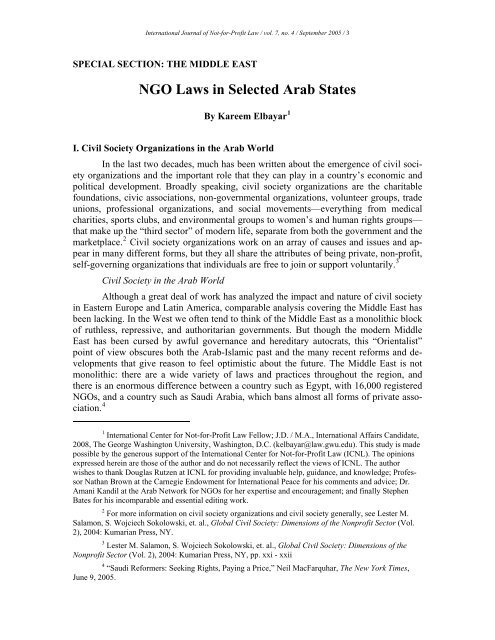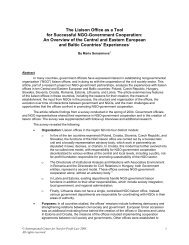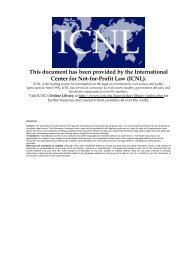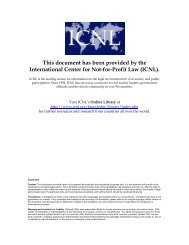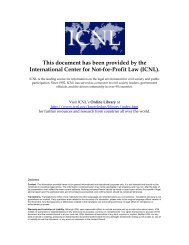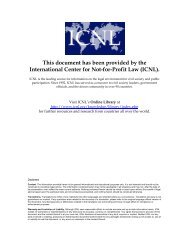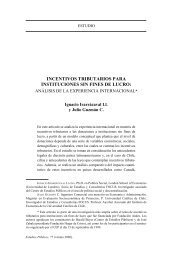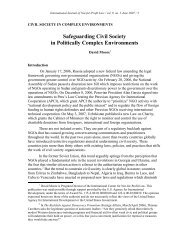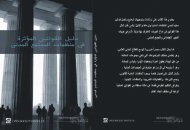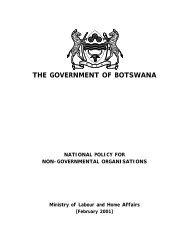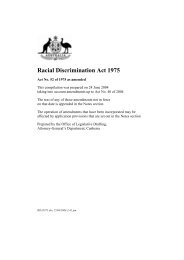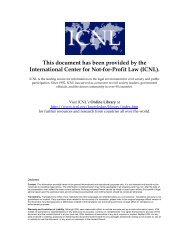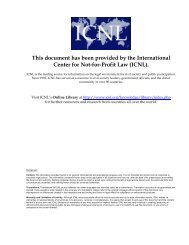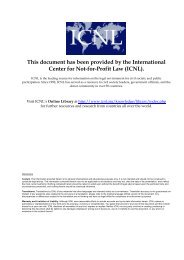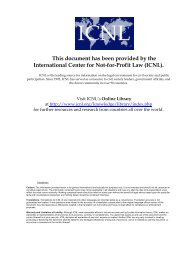NGO Laws in Selected Arab States - The International Center for Not ...
NGO Laws in Selected Arab States - The International Center for Not ...
NGO Laws in Selected Arab States - The International Center for Not ...
You also want an ePaper? Increase the reach of your titles
YUMPU automatically turns print PDFs into web optimized ePapers that Google loves.
<strong>International</strong> Journal of <strong>Not</strong>-<strong>for</strong>-Profit Law / vol. 7, no. 4 / September 2005 / 3SPECIAL SECTION: THE MIDDLE EAST<strong>NGO</strong> <strong>Laws</strong> <strong>in</strong> <strong>Selected</strong> <strong>Arab</strong> <strong>States</strong>By Kareem Elbayar 1I. Civil Society Organizations <strong>in</strong> the <strong>Arab</strong> WorldIn the last two decades, much has been written about the emergence of civil societyorganizations and the important role that they can play <strong>in</strong> a country’s economic andpolitical development. Broadly speak<strong>in</strong>g, civil society organizations are the charitablefoundations, civic associations, non-governmental organizations, volunteer groups, tradeunions, professional organizations, and social movements—everyth<strong>in</strong>g from medicalcharities, sports clubs, and environmental groups to women’s and human rights groups—that make up the “third sector” of modern life, separate from both the government and themarketplace. 2 Civil society organizations work on an array of causes and issues and appear<strong>in</strong> many different <strong>for</strong>ms, but they all share the attributes of be<strong>in</strong>g private, non-profit,self-govern<strong>in</strong>g organizations that <strong>in</strong>dividuals are free to jo<strong>in</strong> or support voluntarily. 3Civil Society <strong>in</strong> the <strong>Arab</strong> WorldAlthough a great deal of work has analyzed the impact and nature of civil society<strong>in</strong> Eastern Europe and Lat<strong>in</strong> America, comparable analysis cover<strong>in</strong>g the Middle East hasbeen lack<strong>in</strong>g. In the West we often tend to th<strong>in</strong>k of the Middle East as a monolithic blockof ruthless, repressive, and authoritarian governments. But though the modern MiddleEast has been cursed by awful governance and hereditary autocrats, this “Orientalist”po<strong>in</strong>t of view obscures both the <strong>Arab</strong>-Islamic past and the many recent re<strong>for</strong>ms and developmentsthat give reason to feel optimistic about the future. <strong>The</strong> Middle East is notmonolithic: there are a wide variety of laws and practices throughout the region, andthere is an enormous difference between a country such as Egypt, with 16,000 registered<strong>NGO</strong>s, and a country such as Saudi <strong>Arab</strong>ia, which bans almost all <strong>for</strong>ms of private association.41 <strong>International</strong> <strong>Center</strong> <strong>for</strong> <strong>Not</strong>-<strong>for</strong>-Profit Law Fellow; J.D. / M.A., <strong>International</strong> Affairs Candidate,2008, <strong>The</strong> George Wash<strong>in</strong>gton University, Wash<strong>in</strong>gton, D.C. (kelbayar@law.gwu.edu). This study is madepossible by the generous support of the <strong>International</strong> <strong>Center</strong> <strong>for</strong> <strong>Not</strong>-<strong>for</strong>-Profit Law (ICNL). <strong>The</strong> op<strong>in</strong>ionsexpressed here<strong>in</strong> are those of the author and do not necessarily reflect the views of ICNL. <strong>The</strong> authorwishes to thank Douglas Rutzen at ICNL <strong>for</strong> provid<strong>in</strong>g <strong>in</strong>valuable help, guidance, and knowledge; ProfessorNathan Brown at the Carnegie Endowment <strong>for</strong> <strong>International</strong> Peace <strong>for</strong> his comments and advice; Dr.Amani Kandil at the <strong>Arab</strong> Network <strong>for</strong> <strong>NGO</strong>s <strong>for</strong> her expertise and encouragement; and f<strong>in</strong>ally StephenBates <strong>for</strong> his <strong>in</strong>comparable and essential edit<strong>in</strong>g work.2 For more <strong>in</strong><strong>for</strong>mation on civil society organizations and civil society generally, see Lester M.Salamon, S. Wojciech Sokolowski, et. al., Global Civil Society: Dimensions of the Nonprofit Sector (Vol.2), 2004: Kumarian Press, NY.3 Lester M. Salamon, S. Wojciech Sokolowski, et. al., Global Civil Society: Dimensions of theNonprofit Sector (Vol. 2), 2004: Kumarian Press, NY, pp. xxi - xxii4 “Saudi Re<strong>for</strong>mers: Seek<strong>in</strong>g Rights, Pay<strong>in</strong>g a Price,” Neil MacFarquhar, <strong>The</strong> New York Times,June 9, 2005.
<strong>International</strong> Journal of <strong>Not</strong>-<strong>for</strong>-Profit Law / vol. 7, no. 4 / September 2005 / 4This article briefly <strong>in</strong>troduces the contours of civil society organizations and thelaws that affect them <strong>in</strong> the Middle East. It profiles ten major Middle Eastern countries,whose laws span the gamut from extremely repressive to excessively liberal. Though theterm “civil society organization” ord<strong>in</strong>arily <strong>in</strong>cludes professional organizations, trade unions,and religious trusts, <strong>in</strong> the Middle East these groups are by and large controlled bythe government or subject to substantial governmental <strong>in</strong>terference. Because of their deepassociation with the government, these groups cannot be considered part of the private,non-governmental “third sector.” This article will there<strong>for</strong>e be limited to an exam<strong>in</strong>ationof secular non-governmental organizations, associations, and foundations. For simplicity,these are referred to throughout the article as “<strong>NGO</strong>s.”Each country profile briefly exam<strong>in</strong>es the state of the domestic civil society sectorand then identifies the applicable <strong>NGO</strong> legal structure and analyzes it <strong>in</strong> terms of global“best practices.” 5 Particular attention throughout has been paid to licens<strong>in</strong>g and registrationrequirements, legal rights and obligations, and government supervision and en<strong>for</strong>cement;other important or oppressive clauses have been highlighted as well. It is my hopethat this survey provides an <strong>in</strong>troductory resource <strong>for</strong> those study<strong>in</strong>g civil society <strong>in</strong> theMiddle East, those work<strong>in</strong>g on the task of Middle Eastern legal re<strong>for</strong>m, and donors and<strong>in</strong>ternational <strong>NGO</strong>s <strong>in</strong>terested <strong>in</strong> expand<strong>in</strong>g their activities <strong>in</strong> or to the region.II. Country ProfilesAlgeriaAlgeria has only recently emerged from a long history of occupation, military dictatorship,and bloody civil war. Although first elected <strong>in</strong> April 1999 amidst widespreadelectoral fraud, President Abdelaziz Bouteflika has embarked on a somewhat successfulprogram of national reconciliation and political modernization. Parliamentary electionsheld <strong>in</strong> 2002 were judged “free of systemic fraud and vote rigg<strong>in</strong>g,” but they were nonethelesscriticized by Freedom House because of the government’s refusal to allow candidatesfrom Islamist parties to seek offices. 6 In 2004, President Bouteflika was reelectedwith almost 85 percent of the vote, <strong>in</strong> what the U.S. State Department said was Algeria’sfirst presidential race s<strong>in</strong>ce <strong>in</strong>dependence that “was democratically contested to theend.” 7 S<strong>in</strong>ce then, Bouteflika’s government has cont<strong>in</strong>ued a program of modernizationand liberalization.Algeria today enjoys a pr<strong>in</strong>t media that Freedom House judges “among the mostvibrant <strong>in</strong> the <strong>Arab</strong> world” 8 and a reenergized and <strong>in</strong>creas<strong>in</strong>gly active civil society sector.Un<strong>for</strong>tunately, the ma<strong>in</strong> law govern<strong>in</strong>g <strong>NGO</strong>s <strong>in</strong> Algeria is the Associations Act of 19905 Many of the laws referred to <strong>in</strong> this survey are available <strong>in</strong> <strong>Arab</strong>ic and English <strong>in</strong> the Onl<strong>in</strong>e Librarysection of the <strong>International</strong> <strong>Center</strong> <strong>for</strong> <strong>Not</strong>-<strong>for</strong>-Profit Law’s website (http://www.icnl.org). For a morecomprehensive treatment of <strong>NGO</strong> law “best practices,” see Guidel<strong>in</strong>es <strong>for</strong> <strong>Laws</strong> Affect<strong>in</strong>g Civic Organizations(Open Society Institute, 2004).6 Freedom House, Freedom <strong>in</strong> the World 2003 (Algeria Country Report),http://freedomhouse.org/research/freeworld/2003/countryrat<strong>in</strong>gs/algeria.htm.7 U.S. State Dept. Background <strong>Not</strong>e: Algeria. http://www.state.gov/r/pa/ei/bgn/8005.htm8 Freedom House, Freedom <strong>in</strong> the World 2003 (Algeria Country Report),http://freedomhouse.org/research/freeworld/2003/countryrat<strong>in</strong>gs/algeria.htm.
<strong>International</strong> Journal of <strong>Not</strong>-<strong>for</strong>-Profit Law / vol. 7, no. 4 / September 2005 / 5(Act 90-31), a highly restrictive law adopted shortly be<strong>for</strong>e the military coup and Algeria’slong decade of violence and terrorism. Although the Bouteflika government has not<strong>in</strong>dicated any <strong>in</strong>tention to <strong>in</strong>clude the Associations Act <strong>in</strong> its campaign of legislativemodernization, Act 90-31 is a prime candidate <strong>for</strong> re<strong>for</strong>m and liberalization.Licens<strong>in</strong>gAct 90-31 def<strong>in</strong>es associations as “<strong>in</strong>dividuals or legal entities” that “<strong>for</strong>m a groupon a contractual basis <strong>for</strong> non-profit purposes,” and requires them to obta<strong>in</strong> a license fromthe government prior to <strong>for</strong>mation. 9 This type of mandatory licens<strong>in</strong>g is an unnecessaryand discourag<strong>in</strong>g burden <strong>for</strong> <strong>NGO</strong>s, the vast majority of which are <strong>in</strong><strong>for</strong>mal organizationswith no need <strong>for</strong> legal personality or government supervision. Mandatory licens<strong>in</strong>g iscommon <strong>in</strong> the Middle East, typically justified by government fear of Islamic fundamentalistand terrorist groups. However, such groups will operate underground with or withoutmandatory licens<strong>in</strong>g requirements, so the practical effect of such laws is to discouragethe establishment of peaceful and moderate organizations while do<strong>in</strong>g little to prevent thespread of more radical groups.Fortunately, Algeria's actual process of licens<strong>in</strong>g is not overly burdensome or expensive,at least <strong>in</strong> comparison to regional standards. <strong>NGO</strong>s need only file a “Declarationof Incorporation” that <strong>in</strong>cludes the names, professions, and addresses of each found<strong>in</strong>gmember; two certified copies of the <strong>NGO</strong>’s statutes; and the m<strong>in</strong>utes from the <strong>NGO</strong>’sfound<strong>in</strong>g meet<strong>in</strong>g. This “declaration” must be filed with the governor of the prov<strong>in</strong>ce <strong>in</strong>which the <strong>NGO</strong> is headquartered (the “wali” of the “wilaya”), and <strong>in</strong> the case of associationsthat operate <strong>in</strong> more than one wilaya, with the M<strong>in</strong>istry of the Interior as well. 10 <strong>The</strong>local agency (and, if applicable, the Interior M<strong>in</strong>istry) has 60 days to approve or deny theapplication, and if no answer is received with<strong>in</strong> that time period, the application is consideredapproved. 11 Upon approval, the <strong>NGO</strong> must publish a notice of its <strong>in</strong>corporation <strong>in</strong>a nationally distributed daily newspaper at its own expense. 12If the government agency rejects the application, the matter is automatically referredto an Adm<strong>in</strong>istrative Court, which must affirm or reverse the agency’s decisionwith<strong>in</strong> 30 days of referral. 13 In theory, automatic referral to court offers protection aga<strong>in</strong>stunjust or arbitrary decisions, but <strong>in</strong> Algeria the agency enjoys so much discretion that thejudicial role is limited. <strong>The</strong> law gives government agencies the right to deny a license ifany founder has “demonstrated conduct contrary to the <strong>in</strong>terests of the fight <strong>for</strong> nationalliberation,” or if the association was “founded <strong>for</strong> a purpose contrary to the established<strong>in</strong>stitutional system,” “public order,” or “public decency.” 14 <strong>The</strong>se terms, further undef<strong>in</strong>ed<strong>in</strong> the law, are so vague that <strong>in</strong> practice the courts are unlikely to reverse an agencydecision. <strong>The</strong> government has not hesitated to use its broad powers to deny licenses to<strong>NGO</strong>s that it f<strong>in</strong>ds embarrass<strong>in</strong>g or otherwise irritat<strong>in</strong>g, most recently the Association of9 Act 90-31 (Algeria): Art. 1.10 Id., Art. 45.11 Id., Arts. 7-8.12 Id., Art. 8.13 Id., Art. 8.14 Id., Arts. 4-5.
<strong>International</strong> Journal of <strong>Not</strong>-<strong>for</strong>-Profit Law / vol. 7, no. 4 / September 2005 / 6Families of the Disappeared of the Wilaya of Constant<strong>in</strong>e, a group focus<strong>in</strong>g on humanrights abuses committed by Algerian security <strong>for</strong>ces. 15Foreign <strong>NGO</strong>s that wish to establish offices <strong>in</strong> Algeria are not subject to any explicitextra requirements, but their licenses must be approved by the M<strong>in</strong>istry of the Interiorregardless of the geographic scope of their operation. 16Legal Rights and ObligationsOnce an Algerian <strong>NGO</strong> obta<strong>in</strong>s a license, it acquires judicial personality and legalcapacity, mean<strong>in</strong>g the right to br<strong>in</strong>g suit as a pla<strong>in</strong>tiff, enter <strong>in</strong>to contracts, and acquirereal property. 17 No practical restra<strong>in</strong>ts are placed on the <strong>NGO</strong>’s ability to raise funds domestically,but any <strong>for</strong>eign donations must be pre-approved by the M<strong>in</strong>istry of the Interior.18 <strong>The</strong> criteria under which the Interior M<strong>in</strong>istry can deny approval are not specified,and an <strong>NGO</strong> that wishes to appeal an adverse decision has no recourse to the courts. Thisclause essentially allows the Interior M<strong>in</strong>istry to starve <strong>NGO</strong>s of a major source of fund<strong>in</strong>g(<strong>in</strong> some cases the only source) at will. Similarly restrictive is the law’s requirementthat the Interior M<strong>in</strong>istry give approval be<strong>for</strong>e any <strong>NGO</strong> can jo<strong>in</strong> an <strong>in</strong>ternational associationor federation, a provision that does noth<strong>in</strong>g but prevent <strong>NGO</strong>s from meet<strong>in</strong>g withtheir peers <strong>in</strong> the <strong>in</strong>ternational community to compare ideas and learn from groups withmore expertise and experience. 19In contrast to the laws of most Middle Eastern states, Algerian law does not imposea specific govern<strong>in</strong>g structure on <strong>NGO</strong>s, though it does require compliance with certa<strong>in</strong>m<strong>in</strong>imum guidel<strong>in</strong>es. 20 However, <strong>NGO</strong>s must report basic <strong>in</strong><strong>for</strong>mation regard<strong>in</strong>gtheir work<strong>for</strong>ce, source of funds, and f<strong>in</strong>ancial position to their local wali on a regular basis.21 <strong>NGO</strong>s are also prohibited from hav<strong>in</strong>g any “<strong>in</strong>stitutional or structural relations”with political associations, but the rights of <strong>NGO</strong>s to participate <strong>in</strong> public policy debates,comment on political developments, and endorse candidates are not abridged. 22<strong>Not</strong>ably, the law does not encourage the <strong>for</strong>mation of <strong>NGO</strong>s by provid<strong>in</strong>g any director <strong>in</strong>direct f<strong>in</strong>ancial benefits, such as tax exemptions or public utility discounts. Even<strong>in</strong> the Middle East, most states now recognize the importance of civil society and seek toexpand <strong>NGO</strong> operations by provid<strong>in</strong>g such <strong>in</strong>centives – but not Algeria.Supervision and En<strong>for</strong>cementAct 90-31 allows the government to dissolve or suspend any <strong>NGO</strong>, but <strong>in</strong> order todo so the Interior M<strong>in</strong>istry must first obta<strong>in</strong> a court order stat<strong>in</strong>g that the <strong>NGO</strong> has vio-15 Freedom House, Freedom <strong>in</strong> the World 2003 (Algeria Country Report),http://freedomhouse.org/research/freeworld/2003/countryrat<strong>in</strong>gs/algeria.htm.16 Act 90-31 (Algeria): Arts. 39-44.17 Id., Art. 16.18 Id., Art. 28.19 Id., Art. 21.20 Id., Art. 23.21 Id., Art. 18.22 Id., Art. 11.
<strong>International</strong> Journal of <strong>Not</strong>-<strong>for</strong>-Profit Law / vol. 7, no. 4 / September 2005 / 7lated a major provision of the law. 23 <strong>The</strong> fact that the Interior M<strong>in</strong>istry cannot simply dissolvean <strong>NGO</strong> on its own may appear positive, but aga<strong>in</strong> the law is so broad that the InteriorM<strong>in</strong>istry can ord<strong>in</strong>arily obta<strong>in</strong> the necessary court order with ease. In any case, theAlgerian judiciary is not quite an <strong>in</strong>dependent branch of government; it is largely dependenton the M<strong>in</strong>istry of Justice, which can remove judges at any time. 24 Algerianjudges are thus unlikely to challenge the assertions of the executive branch. Even worse,Act 90-31 provides <strong>for</strong> between three months' and two years' imprisonment and a f<strong>in</strong>e <strong>for</strong>any <strong>in</strong>dividual who “directs, adm<strong>in</strong>isters, or promotes” or “encourage[s] the meet<strong>in</strong>g ofmembers” <strong>in</strong> “a non-accredited, suspended, or dissolved association.” 25 Rather than encouragethe <strong>for</strong>mation of <strong>NGO</strong>s, provisions such as these seem specifically designed todiscourage <strong>NGO</strong>s and the civil society sector <strong>in</strong> general.A Cont<strong>in</strong>u<strong>in</strong>g ProcessAlthough Algeria has made progress s<strong>in</strong>ce the end of its civil war, there is stillmuch to be done. <strong>NGO</strong>s can play an important role <strong>in</strong> the cont<strong>in</strong>u<strong>in</strong>g modernization anddevelopment of the country, but they cannot do so without a regulatory and legal environmentthat encourages their <strong>for</strong>mation.EgyptEgypt is the most populous country <strong>in</strong> the Middle East, a major United <strong>States</strong> ally,and regional power whose laws, courts, and social norms often serve as models <strong>for</strong> emulationby other <strong>Arab</strong> states. Cairo’s decisions <strong>in</strong>fluence those taken <strong>in</strong> capitals throughoutthe <strong>Arab</strong> region, and it is no co<strong>in</strong>cidence that the <strong>Arab</strong> League is headquartered <strong>in</strong>Egypt’s capital city. Although several other <strong>Arab</strong> states provide a more liberal environment<strong>for</strong> the operation of civil society groups, Egypt’s <strong>in</strong>fluence and status as a trendsetter<strong>for</strong> the <strong>Arab</strong> ma<strong>in</strong>stream suggests the particular importance of its civil society sector,laws and practices.Civil society <strong>in</strong> Egypt is governed by the provisions of the Law on Non-Governmental Societies and Organizations (No. 84 of 2002) and the Executive Statuteon Law 84 of 2002 (M<strong>in</strong>istry of Insurance and Social Affairs Decree No. 178 of2002), which implements and clarifies the provisions of the parliamentary law. Despitethe highly restrictive nature of its civil society laws, Egypt has one of the largest andmost vibrant civil society sectors <strong>in</strong> the entire develop<strong>in</strong>g world. A 1999 survey undertakenby the <strong>Arab</strong> <strong>NGO</strong> Network <strong>for</strong> Development found that Egypt’s civil society sectoremployed the equivalent of 629,223 full-time workers, account<strong>in</strong>g <strong>for</strong> $1.5 billion <strong>in</strong> expenditures(approximately 2 percent of Egypt’s GDP)—and this survey did not take <strong>in</strong>to23 Id., Arts. 32-38.24 Freedom House, Freedom <strong>in</strong> the World 2003 (Algeria Country Report),http://freedomhouse.org/research/freeworld/2003/countryrat<strong>in</strong>gs/algeria.htm.25 Act 90-31 (Algeria): Art. 45.
<strong>International</strong> Journal of <strong>Not</strong>-<strong>for</strong>-Profit Law / vol. 7, no. 4 / September 2005 / 8account the substantial impact of religious-based groups. 26 Al-Ahram, Egypt’s officialnewspaper of record, estimated that <strong>in</strong> 2003 more than 16,000 <strong>NGO</strong>s were registered. 27It may seem <strong>in</strong>congruous that so many <strong>NGO</strong>s and civil society groups can exist <strong>in</strong>a country whose <strong>NGO</strong> law has been called “one of the most restrictive <strong>in</strong> the world,” 28but Law 84 / 2002 is not so much restrictive as it is discretionary. Law 84 / 2002 givesenormous discretionary powers to the M<strong>in</strong>istry of Insurance and Social Affairs (MOSA).In practice, however, the full weight of this authority is brought to bear only aga<strong>in</strong>st organizationsand <strong>in</strong>dividuals that cross the government’s “red l<strong>in</strong>es” <strong>in</strong> push<strong>in</strong>g <strong>for</strong> socialre<strong>for</strong>m and political liberalization. <strong>The</strong> vast majority of Egyptian <strong>NGO</strong>s, consciouslyapolitical and primarily concerned with issues such as the environment, education, andwelfare, are generally left to operate without substantial government <strong>in</strong>terference.Licens<strong>in</strong>gAs with most Middle Eastern states, licens<strong>in</strong>g of <strong>NGO</strong>s <strong>in</strong> Egypt is mandatory.Law 84 / 2002 requires any “group whose purpose <strong>in</strong>cludes or that carries out any of theactivities of associations and <strong>in</strong>stitutions, even if it assumes a legal <strong>for</strong>m other than that ofassociations and <strong>in</strong>stitutions” to operate with a permit from MOSA. 29 This provision effectivelyprecludes <strong>in</strong><strong>for</strong>mal, unlicensed groups. Its emphasis on activities rather than legal<strong>for</strong>ms similarly precludes <strong>NGO</strong>s from <strong>in</strong>corporat<strong>in</strong>g as civil companies or law firms(as many did be<strong>for</strong>e the law's enactment) <strong>in</strong> an attempt to avoid the more onerous provisionsof the <strong>NGO</strong> law. <strong>The</strong> licens<strong>in</strong>g process itself is time-consum<strong>in</strong>g and tedious, requir<strong>in</strong>g<strong>NGO</strong>s to submit to MOSA two copies of the society’s bylaws; two copies of a list ofthe founders, <strong>in</strong>clud<strong>in</strong>g their names, ages, nationalities, professions, and addresses; a declarationfrom each found<strong>in</strong>g member that no crim<strong>in</strong>al judgment has ever been madeaga<strong>in</strong>st him or her; a document list<strong>in</strong>g the found<strong>in</strong>g member who will represent the founders<strong>in</strong> any adm<strong>in</strong>istrative or legal matter; an occupancy deed demonstrat<strong>in</strong>g that the<strong>NGO</strong> has a physical headquarters; and f<strong>in</strong>ally a £E 100 deposit <strong>in</strong>to the account of thegovernment-run “Fund <strong>for</strong> Support of Non-Governmental Societies and Associations.”<strong>The</strong> mandatory deposit and occupancy deed requirements can pose major obstacles to licens<strong>in</strong>gnew <strong>NGO</strong>s, many of which start out <strong>in</strong> a founder’s home and lack the resourcesto obta<strong>in</strong> real estate <strong>for</strong> separate headquarters.Foreign <strong>NGO</strong>s are not allowed to operate <strong>in</strong> Egypt without secur<strong>in</strong>g the permissionof the M<strong>in</strong>istry of Foreign Affairs. <strong>The</strong> M<strong>in</strong>istry's decision is based on unspecifiedfactors and not subject to any court appeal. 30Once all of the necessary paperwork has been submitted, MOSA is required to acceptor reject the application with<strong>in</strong> 60 days; otherwise, the application is considered ac-26 Lester M. Salamon, S. Wojciech Sokolowski, et. al., Global Civil Society: Dimensions of theNonprofit Sector (Vol. 2), 2004: Kumarian Press, NY, p. 217.27 “Judges rule out compliance,” Mariz Tadros, Al-Ahram Weekly Onl<strong>in</strong>e, 12-18 June 2003 (IssueNo. 642), http://weekly.ahram.org.eg/2003/642/eg12.htm.28 “<strong>The</strong> Impact of <strong>NGO</strong>s on the State & Non-State Relations <strong>in</strong> the Middle East,” Peter Gubser,Middle East Policy, March. 2002, Volume 9, Issue 1, p. 141.29 Law 84 / 2002 (Egypt): Preamble, Art. 430 Id., Art. 1
<strong>International</strong> Journal of <strong>Not</strong>-<strong>for</strong>-Profit Law / vol. 7, no. 4 / September 2005 / 9cepted. This is a substantial improvement over the previous associations and foundationslaw (Law 32 of 1964), which set no limit on how long MOSA could take <strong>in</strong> consider<strong>in</strong>gan application, thus enabl<strong>in</strong>g MOSA to “process” an application <strong>for</strong> years. If MOSA rejectsan application, it must do so <strong>in</strong> writ<strong>in</strong>g and provide substantiated reasons <strong>for</strong> its decision.Associations have the right to appeal a rejection <strong>in</strong> court.All of these positive aspects of Law 84 / 2002, un<strong>for</strong>tunately, do not herald a newattitude on the part of the Egyptian government toward civil society groups. AlthoughLaw 84 requires MOSA to respond to an application <strong>for</strong> a license with<strong>in</strong> 60 days, eventhe state-run press has reported both MOSA’s tendency to return applications as <strong>in</strong>completerather than accept them and be bound by the 60-day time limit; and <strong>in</strong>stances ofgroups hav<strong>in</strong>g to wait “more than three months” without receiv<strong>in</strong>g an acknowledgmentthat an application has been filed, <strong>in</strong> contravention of Law 84’s clear <strong>in</strong>structions otherwise.31 In any case, Law 84 / 2002 gives MOSA so much discretionary leeway that it canreject applications arbitrarily while technically comply<strong>in</strong>g with the law. MOSA has theright to refuse the application of an <strong>NGO</strong> that is threaten<strong>in</strong>g to “national unity” or mightviolate “public order or morals.” 32 Nowhere are these vague terms clarified, and so, aswith the Algerian case, Egyptian courts are unlikely to reverse M<strong>in</strong>istry decisions. MOSAthus effectively has the authority to prevent the licens<strong>in</strong>g of any group it perceives as athreat to the government, simply by ground<strong>in</strong>g its decision <strong>in</strong> the language of morality orsecurity.Legal Rights and ObligationsIf an <strong>NGO</strong> does obta<strong>in</strong> a license under Law 84 / 2002—and at least 10,000 groupshave done so 33 —its legal rights rema<strong>in</strong> constra<strong>in</strong>ed. Law 84 / 2002 repeatedly takes thesort of narrow, focused restrictions most countries put <strong>in</strong> place to prevent fraud or corruptionand converts them <strong>in</strong>to standards that are broad, vague, and sometimes virtually <strong>in</strong>comprehensible.For example, the law prohibits “unionist activity,” which seems sensiblegiven that unions are regulated by a separate law. But the actual language of the prohibition– <strong>NGO</strong>s are banned from “claim<strong>in</strong>g specific professionals’ rights vis-à-vis employers”34 – is difficult to parse. Nasser Am<strong>in</strong> of the <strong>Arab</strong> Centre <strong>for</strong> Independence of the Judiciaryand the Legal Profession puts it succ<strong>in</strong>ctly: “Our center concerns itself withviolations committed aga<strong>in</strong>st lawyers and judges. [What happens when] a low-level civilservant <strong>in</strong>terprets that as tak<strong>in</strong>g the side of the legal profession, caus<strong>in</strong>g obstacles to ourregistration?” 35 Similarly, the Egyptian law prohibits <strong>NGO</strong>s from engag<strong>in</strong>g <strong>in</strong> any “politicalactivity,” <strong>in</strong>clud<strong>in</strong>g “advocat<strong>in</strong>g the program of one of the parties,” contribut<strong>in</strong>gmoney to support an electoral campaign, spend<strong>in</strong>g money <strong>in</strong> support of party activity or a31 See “Matters of permission,” Mariz Tadros, Al-Ahram Weekly Onl<strong>in</strong>e, 5-11 June 2003 (IssueNo. 641), http://weekly.ahram.org.eg/2003/641/fr2.htm.32 Law 84 / 2002 (Egypt): Art. 11(2), Art. 6, Art. 42.33 See “Matters of permission,” Mariz Tadros, Al-Ahram Weekly Onl<strong>in</strong>e, 5-11 June 2003 (IssueNo. 641), http://weekly.ahram.org.eg/2003/641/fr2.htm.34 M<strong>in</strong>istry of Insurance and Social Affairs Decree 178 / 2002 (Egypt): Art. 25.35 “Regulat<strong>in</strong>g or restra<strong>in</strong><strong>in</strong>g?” Mariz Tadros, Al-Ahram Weekly Onl<strong>in</strong>e, 7-13 November 2002 (IssueNo. 611), http://weekly.ahram.org.eg/2002/611/eg4.htm.
<strong>International</strong> Journal of <strong>Not</strong>-<strong>for</strong>-Profit Law / vol. 7, no. 4 / September 2005 / 10candidate, or endors<strong>in</strong>g or “putt<strong>in</strong>g <strong>for</strong>ward candidates <strong>in</strong> the name of the society.” 36<strong>NGO</strong>s have an important role to play <strong>in</strong> public policy debates, and they should not be sothoroughly silenced.In addition to these restrictions on the outside activities of <strong>NGO</strong>s, Law 84 / 2002prohibits <strong>NGO</strong>s from mak<strong>in</strong>g many <strong>in</strong>ternal decisions without first obta<strong>in</strong><strong>in</strong>g governmentapproval. <strong>The</strong> law mandates the organizational structure of each <strong>NGO</strong> to a high degree ofspecificity, and requires all of them to jo<strong>in</strong> regional, state-level, and national umbrella organizations.37 <strong>NGO</strong>s are not allowed to expand their work <strong>in</strong>to any new “project areas”that were not a part of their orig<strong>in</strong>al charter, and they are prohibited from collect<strong>in</strong>g fundsfrom abroad or affiliat<strong>in</strong>g with <strong>for</strong>eign or domestic groups or unions without MOSApermission. 38Law 84 / 2002 does, however, confer many benefits on the <strong>NGO</strong>s that manage toobta<strong>in</strong> a license and comply with its regulations, <strong>in</strong>clud<strong>in</strong>g a reduction <strong>in</strong> telephone, water,electricity, and gas charges; a 25 percent discount on railway shipments; and an exemptionfrom stamp taxes, customs duties, and contract registration fees.Supervision and En<strong>for</strong>cementAs with much of Law 84 / 2002, the provisions deal<strong>in</strong>g with supervision of <strong>NGO</strong>sand en<strong>for</strong>cement of the law are vague, arbitrary, and unnecessarily severe. MOSA has theauthority to dissolve any <strong>NGO</strong> at any time if f<strong>in</strong>ds that the organization is “threaten<strong>in</strong>gnational unity” or “violat<strong>in</strong>g public order or morals.” 39 And although any MOSA dissolutionorder is appealable to the adm<strong>in</strong>istrative courts, an appeal can take several years <strong>in</strong>Egypt’s backlogged court system. As an example, the Egyptian Organization <strong>for</strong> HumanRights fought MOSA <strong>in</strong> court <strong>for</strong> more than ten years. 40 Although it ultimately prevailed,the well-respected human rights group wasted enormous amounts of time and money <strong>in</strong>its decade-long fight <strong>for</strong> legal recognition.More worrisome, from the standpo<strong>in</strong>t of encourag<strong>in</strong>g civil society, Law 84 / 2002imposes severe <strong>in</strong>dividual penalties <strong>for</strong> non-compliance with the law. 41 <strong>The</strong>se penalties<strong>in</strong>clude up to one year <strong>in</strong> prison and a f<strong>in</strong>e of up to 10,000 Egyptian pounds <strong>for</strong> establish<strong>in</strong>gan association that threatens “national unity” or violates “public order or morals”; upto six months <strong>in</strong> prison and a f<strong>in</strong>e of up to £E 2,000 <strong>for</strong> conduct<strong>in</strong>g <strong>NGO</strong> activity “withoutfollow<strong>in</strong>g the provisions prescribed” by the law, conduct<strong>in</strong>g activity despite a courtrul<strong>in</strong>g dissolv<strong>in</strong>g or suspend<strong>in</strong>g an association, or collect<strong>in</strong>g or send<strong>in</strong>g funds abroadwithout MOSA permission; and up to three months <strong>in</strong> prison and a f<strong>in</strong>e of up to £E 1,000<strong>for</strong> conduct<strong>in</strong>g <strong>NGO</strong> activity without a license from MOSA, affiliat<strong>in</strong>g with a <strong>for</strong>eign36 M<strong>in</strong>istry of Insurance and Social Affairs Decree 178 / 2002 (Egypt): Art. 25.37 Id., Chapter 9.38 M<strong>in</strong>istry of Insurance and Social Affairs Decree 178 / 2002 (Egypt): Art. 48; Law 84 / 2002(Egypt): Arts. 16-17.39 Law 84 / 2002 (Egypt): Art. 11(2), Art. 6, Art. 42.40 “Braced <strong>for</strong> new challenges,” Gihan Shah<strong>in</strong>e, Al-Ahram Weekly Onl<strong>in</strong>e, 10-16 July 2003 (IssueNo. 646), http://weekly.ahram.org.eg/2003/646/eg2.htm.41 Law 84 / 2002 (Egypt): Art. 76.
<strong>International</strong> Journal of <strong>Not</strong>-<strong>for</strong>-Profit Law / vol. 7, no. 4 / September 2005 / 11<strong>NGO</strong> network or association without MOSA permission, or merg<strong>in</strong>g with another associationwithout MOSA approval.Restrictions such as these throw cold water on the entire concept of civil society.<strong>Laws</strong> should, of course, be en<strong>for</strong>ced, but violations of civil society laws are best punishedwith f<strong>in</strong>es and adm<strong>in</strong>istrative penalties. Crim<strong>in</strong>al sanctions should be used only <strong>in</strong> themost exceptional cases. Mak<strong>in</strong>g prison terms the standard punishment discourages <strong>in</strong>dividualsfrom <strong>for</strong>m<strong>in</strong>g <strong>NGO</strong>s, lest they risk their personal freedom and livelihood—<strong>in</strong>marked contrast to the Egyptian government’s self-proclaimed “commitment to support<strong>in</strong>gvoluntary civic work.” 42<strong>The</strong> Role of the JudiciaryEgypt’s judiciary is admired and well-respected as one of the most <strong>in</strong>dependentand fair <strong>in</strong>stitutions <strong>in</strong> the entire Middle East. Although the Egyptian executive branchexerts an <strong>in</strong>ord<strong>in</strong>ate amount of <strong>in</strong>fluence over the judiciary, the judiciary has nonethelessprotected the rights of <strong>NGO</strong>s <strong>in</strong> a noteworthy manner (and more importantly, the executivebranch has complied with its rul<strong>in</strong>gs). Perhaps with this history <strong>in</strong> m<strong>in</strong>d, Law 84 /2002 gives MOSA the power to dissolve civil society groups, refuse their applications,and imprison their members, all without first mak<strong>in</strong>g a case <strong>in</strong> court. Only after MOSAhas acted and the damage has been done can an <strong>NGO</strong> lodge an appeal—and, as discussedabove, appeals can take months or even years. But unless and until Law 84 / 2002 is revised,the Egyptian judiciary, overwhelmed as it is, will rema<strong>in</strong> the only protection <strong>for</strong><strong>NGO</strong>s aga<strong>in</strong>st the abuses of the M<strong>in</strong>istry of Social Affairs.IraqIt goes without say<strong>in</strong>g that Iraq is a country <strong>in</strong> a major state of flux, struggl<strong>in</strong>g toleave beh<strong>in</strong>d <strong>in</strong>stability and <strong>in</strong>security and trans<strong>for</strong>m itself <strong>in</strong>to what the world hopes willbe a secure, modern, and democratic state. Because of ongo<strong>in</strong>g military operations and ageneral lack of security, it is difficult to measure the size and scale of <strong>NGO</strong> operations <strong>in</strong>Iraq today. What is clear is that <strong>in</strong> the immediate wake of the war, many <strong>in</strong>ternational<strong>NGO</strong>s set up operations <strong>in</strong> Iraq, but as security conditions cont<strong>in</strong>ued to deteriorate, a significantproportion of them ceased operations and left the country. Nevertheless, a significant<strong>for</strong>eign and domestic <strong>NGO</strong> presence rema<strong>in</strong>s. <strong>The</strong> importance of these groupscannot be overstated: not only are they help<strong>in</strong>g to alleviate the major humanitarian crisisthat looms over the country, they are also lay<strong>in</strong>g the groundwork <strong>for</strong> Iraq’s eventual democratictransition.<strong>The</strong> <strong>NGO</strong> law <strong>in</strong> <strong>for</strong>ce <strong>in</strong> Iraq today, which supersedes the older <strong>NGO</strong> laws of theBa’athist regime (No. 34 of 1962 and No. 13 of 2000), is, perhaps surpris<strong>in</strong>gly, comparableto the more restrictive <strong>NGO</strong> laws of the Middle East. Government officials justifyCoalition Provisional Authority Order Number 45’s restrictions as necessary to establisha safe and secure Iraq, but <strong>in</strong> practice the law <strong>in</strong>hibits the groups that have been42 Statement of M<strong>in</strong>ister of Social Affairs Am<strong>in</strong>a El-Gu<strong>in</strong>dy, as quoted <strong>in</strong> “Regulat<strong>in</strong>g or restra<strong>in</strong><strong>in</strong>g?”Mariz Tadros, Al-Ahram Weekly Onl<strong>in</strong>e, 7-13 November 2002 (Issue No. 611),http://weekly.ahram.org.eg/2002/611/eg4.htm.
<strong>International</strong> Journal of <strong>Not</strong>-<strong>for</strong>-Profit Law / vol. 7, no. 4 / September 2005 / 12called “among the most important contributors to reconstruction” while do<strong>in</strong>g little tostop illegitimate groups, which operate underground <strong>in</strong> any case. 43Licens<strong>in</strong>gAll <strong>NGO</strong>s wish<strong>in</strong>g to operate <strong>in</strong> Iraq are required to obta<strong>in</strong> a license from the<strong>NGO</strong> Assistance Office, a subsidiary of the M<strong>in</strong>istry of Plann<strong>in</strong>g and Development (soonto be the M<strong>in</strong>istry of State <strong>for</strong> Civil Society). Licens<strong>in</strong>g is mandatory and <strong>in</strong><strong>for</strong>mal groupsare explicitly prohibited from operat<strong>in</strong>g any “programs.” 44 <strong>The</strong> law is unclear on thestatus of <strong>for</strong>eign <strong>NGO</strong>s, with some provisions <strong>in</strong>dicat<strong>in</strong>g that they need only be accreditedby the M<strong>in</strong>ister of Foreign Affairs and others <strong>in</strong>dicat<strong>in</strong>g that they are also subject tothe requirements placed on domestic <strong>NGO</strong>s. 45 What is clear is that domestic <strong>NGO</strong>s mustprovide the <strong>NGO</strong> Office with a mass of <strong>in</strong><strong>for</strong>mation: a “complete statement of revenueand expenses and assets and liabilities <strong>for</strong> the current year and the previous three years”or, if the <strong>NGO</strong> has existed <strong>for</strong> less than four years, “f<strong>in</strong>ancial data <strong>for</strong> the current year andprojected budget <strong>for</strong> the next two years”; a list of the names and addresses of any donorsor non-bank lenders of funds to the <strong>NGO</strong>; and “a report on [the] proposed program [ofthe <strong>NGO</strong>] prepared <strong>in</strong> consultation with the Relevant M<strong>in</strong>istry and budget <strong>for</strong> the firstyear of its activities.” 46 <strong>The</strong>se requirements impose a major burden on new <strong>NGO</strong>s, mostof which lack the operat<strong>in</strong>g experience necessary to provide this type of <strong>in</strong><strong>for</strong>mation.Once all of the required documents are submitted, the <strong>NGO</strong> Office has 45 bus<strong>in</strong>essdays to grant or deny the license. However, if the <strong>NGO</strong> Office requires more <strong>in</strong><strong>for</strong>mation,the 45-day period starts anew from the date that it receives the additional <strong>in</strong><strong>for</strong>mation.Unlike some other <strong>Arab</strong> countries, Iraq does not provide <strong>for</strong> automatic licens<strong>in</strong>gif the responsible office fails to respond by the deadl<strong>in</strong>e – so if the <strong>NGO</strong> Office takeslonger than the statutory 45-day period, there are no practical consequences and the <strong>NGO</strong>has little recourse. In any case, the <strong>NGO</strong> Office can deny licens<strong>in</strong>g to any <strong>NGO</strong> thatwould “constitute a threat to the public order, safety, stability, or security of Iraq,” a provisionthat, though perhaps understandable, is nonetheless open to abuse—especiallygiven that the law provides no opportunity to appeal a refusal to any court or higher adm<strong>in</strong>istrativeauthority. 47Legal Rights and Benefits<strong>The</strong> legal rights of <strong>NGO</strong>s <strong>in</strong> Iraq are not as severely limited as they are <strong>in</strong> otherMiddle Eastern countries. Iraqi <strong>NGO</strong>s are free to merge, dissolve, and divide withoutgovernment approval, though they are required to notify the <strong>NGO</strong> Office of these typesof actions. 48 Although <strong>NGO</strong>s have the explicit right to raise funds with<strong>in</strong> Iraq, the statute43 “Comments on the Regulation of Non-Governmental Organizations Issued by the CoalitionProvisional Authority, Order Number 45,” Cathy Shea, ICNL, p. 1.44 CPA Order 45 (Iraq): Section 2(3).45 Compare CPA Order 45 (Iraq), Section 2.2 (“<strong>International</strong> Organization shall be accredited bythe M<strong>in</strong>ister of Foreign Affairs, or his or her designee, and are not required to register as <strong>NGO</strong>s.”) with, <strong>for</strong>example, Section 2.4(b)(ix) (“Foreign <strong>NGO</strong>s must provide the name of the head of mission <strong>in</strong> Iraq….”).46 CPA Order 45 (Iraq): Section 2.47 Id., Sec. 3.48 Id., Secs. 8, 4.
<strong>International</strong> Journal of <strong>Not</strong>-<strong>for</strong>-Profit Law / vol. 7, no. 4 / September 2005 / 13is silent about <strong>for</strong>eign donations. 49 Iraqi <strong>NGO</strong>s are free to establish their own govern<strong>in</strong>gstructures, though perhaps here CPA Order 45 falls a bit short by fail<strong>in</strong>g to set m<strong>in</strong>imumstandards of good governance.A major shortcom<strong>in</strong>g of the law is the requirement that all <strong>NGO</strong>s be “nonpolitical.”50 It is often sensible to restrict <strong>NGO</strong>s from directly fund<strong>in</strong>g candidates or politicalparties; if that is all that is meant, this clause should be made more specific. Aswritten, the prohibition is too broad. Similarly, though <strong>NGO</strong>s have the right to appealmost adm<strong>in</strong>istrative actions taken aga<strong>in</strong>st them by the <strong>NGO</strong> Office, this appeal is not toan <strong>in</strong>dependent court but the <strong>NGO</strong> Office itself, which aga<strong>in</strong> <strong>in</strong>creases the likelihood ofabuse of government discretion.Supervision and En<strong>for</strong>cementCPA Order 45 gives the government the right to “suspend or revoke a registrationof an <strong>NGO</strong> if the <strong>NGO</strong> violates any provision” of the Order. 51 If an <strong>NGO</strong> cont<strong>in</strong>ues tooperate after suspension or revocation of its license, the government can confiscate all ofits property. 52 In other words, the government has the authority to impose drastic sanctionson <strong>NGO</strong>s regardless of how m<strong>in</strong>or the violation may be. <strong>The</strong> law would be muchimproved if it imposed sanctions tailored to the severity of violations. Another shortcom<strong>in</strong>gis that the law does not provide <strong>for</strong> judicial supervision of executive actions—<strong>NGO</strong>scannot appeal adverse decisions made by the government, and they generally have no recourseif they feel that a decision has been taken <strong>in</strong> error. Although the Iraqi judicial systemis not yet operat<strong>in</strong>g at full capacity, neither are any other Iraqi <strong>in</strong>stitutions, so thatfact cannot justify the failure to provide <strong>for</strong> judicial oversight. Even the most highly restrictivelaws generally provide <strong>for</strong> appeal to a judicial authority.Transition to DemocracyAs Iraq cont<strong>in</strong>ues its democratic transition, <strong>NGO</strong>s will no doubt play a major role.<strong>NGO</strong>s help to build a pluralistic society from the ground up, and many serve as watchdogsof efficient, transparent government. <strong>The</strong> new Iraq should encourage the <strong>for</strong>mationof a wide variety of <strong>NGO</strong>s, rather than impos<strong>in</strong>g a difficult licens<strong>in</strong>g process and provid<strong>in</strong>glittle <strong>in</strong>centive to <strong>for</strong>m <strong>NGO</strong>s. Encourag<strong>in</strong>gly, the new transitional Iraqi governmenthas <strong>in</strong>dicated that review of the <strong>NGO</strong> law is among its top legislative priorities.Jordan<strong>The</strong> outbreak of the Palest<strong>in</strong>ian <strong>in</strong>tifada <strong>in</strong> 2000 led to massive <strong>in</strong>stability <strong>in</strong> Jordan,where Palest<strong>in</strong>ian refugees constitute the majority of the population. Faced with astagnat<strong>in</strong>g economy and mass demonstrations protest<strong>in</strong>g Jordan’s peace treaty with Israel,K<strong>in</strong>g Abdullah dissolved parliament and began to rule by decree, revers<strong>in</strong>g what hadbeen a positive trend toward political liberalization begun by his father, K<strong>in</strong>g Husse<strong>in</strong>,almost a decade earlier. In 2003 the K<strong>in</strong>g allowed parliamentary and municipal elections,which accord<strong>in</strong>g to Freedom House were “reasonably free and transparent, though not49 Id., Sec. 7.50 Id., Sec. 2.3(e)(iii).51 Id., Sec. 3.6.52 Id., Sect/ 1(6).
<strong>International</strong> Journal of <strong>Not</strong>-<strong>for</strong>-Profit Law / vol. 7, no. 4 / September 2005 / 14fair,” and abolished many of the restrictions on personal liberties <strong>in</strong>stituted dur<strong>in</strong>g theprevious two years. 53 K<strong>in</strong>g Abdullah has s<strong>in</strong>ce made a concerted public ef<strong>for</strong>t to guideJordan to a new era of political and civil liberty, and Jordan today is unquestionablyamong the more liberal and modern states of the Middle East region.Much like Egypt, Jordan has both a very large and vibrant <strong>NGO</strong> sector made upof hundreds of organizations and, counter-<strong>in</strong>tuitively, a very restrictive <strong>NGO</strong> law. <strong>The</strong>Societies and Social Bodies Law (No. 33 of 1966) is one of the oldest and most arbitrary<strong>NGO</strong> laws <strong>in</strong> the Middle East, but the government generally does not en<strong>for</strong>ce the moreunreasonable provisions, choos<strong>in</strong>g <strong>in</strong>stead to “rout<strong>in</strong>ely license” <strong>NGO</strong>s, “dozens of[which] address numerous political and social issues.” 54 A 2001 survey counted at least2,000 civil society groups work<strong>in</strong>g on issues rang<strong>in</strong>g from women’s rights and the environmentto health and political re<strong>for</strong>m. 55 Many <strong>for</strong>eign <strong>NGO</strong>s conduct operations <strong>in</strong> Jordan,<strong>in</strong>clud<strong>in</strong>g Caritas, Care <strong>International</strong>, and Save the Children. <strong>The</strong> vibrancy of the<strong>NGO</strong> sector testifies to the restra<strong>in</strong>t of the Jordanian government <strong>in</strong> generally absta<strong>in</strong><strong>in</strong>gfrom exercis<strong>in</strong>g its extensive powers under Law 33 / 1966.Licens<strong>in</strong>gNo <strong>NGO</strong> can <strong>for</strong>m or conduct operations <strong>in</strong> the K<strong>in</strong>gdom of Jordan without expresswritten permission from the M<strong>in</strong>ster of Social Development. 56 <strong>The</strong> process of obta<strong>in</strong><strong>in</strong>gthis permission is excessively long and complicated. First, an <strong>NGO</strong> must submitten copies of an application <strong>for</strong> registration to the Director of the regional Office of SocialDevelopment <strong>in</strong> the district <strong>in</strong> which the <strong>NGO</strong> will be located. 57 <strong>The</strong> application itselfmust <strong>in</strong>clude a substantial amount of <strong>in</strong><strong>for</strong>mation, <strong>in</strong>clud<strong>in</strong>g articles of association,f<strong>in</strong>ancial procedures, pr<strong>in</strong>cipal objectives, and the names, professions, ages, and addressesof the found<strong>in</strong>g members (all of whom must be at least 21 years old). 58 <strong>The</strong> DistrictOffice Director must then send the application, along with his comments, to the NationalDirector General of Social Development with<strong>in</strong> 30 days. <strong>The</strong> Director Generalmust then attach his comments to the proposal be<strong>for</strong>e <strong>for</strong>ward<strong>in</strong>g the entire package,with<strong>in</strong> 15 days, to the M<strong>in</strong>ister of Social Development. F<strong>in</strong>ally, the M<strong>in</strong>ister of SocialDevelopment has the power to “issue the decision which he sees proper <strong>in</strong> respect fromthe application with<strong>in</strong> a period not exceed<strong>in</strong>g three months from the date of send<strong>in</strong>g tohim.” 59 If each official takes the maximum amount of time allotted by statute, an <strong>NGO</strong>can wait up to 135 days <strong>for</strong> a decision on its application. Worse still, the law gives theM<strong>in</strong>ister of Social Development the right to reject an application <strong>for</strong> any reason the M<strong>in</strong>-53 Freedom House, Freedom <strong>in</strong> the World 2004 (Jordan Country Report),http://freedomhouse.org/research/freeworld/2004/countryrat<strong>in</strong>gs/jordan.htm.54 Id.55 Directory of Civil Society Organizations <strong>in</strong> Jordan, Hani Hourani, Edited by Ica Wahbeh, S<strong>in</strong>badPublish<strong>in</strong>g House, Amman, Jordan, 2001 (Al-Urdun Al-Jadid Research <strong>Center</strong>), p. 10.56 Law No. 33 / 1966 (Jordan): Article 5.57 Id., Art. 7(1).58 Id., Art. 6.59 Id., Art. 7.
<strong>International</strong> Journal of <strong>Not</strong>-<strong>for</strong>-Profit Law / vol. 7, no. 4 / September 2005 / 15ister sees fit, and there is no mechanism <strong>for</strong> judicial review of the M<strong>in</strong>ister’s decision, or<strong>in</strong>deed appeal of any sort whatsoever aga<strong>in</strong>st an adverse decision.<strong>The</strong>re is a default registration provision, whereby if no response is received fromthe M<strong>in</strong>ister of Social Development with<strong>in</strong> 30 days from the date that the application hasbeen <strong>for</strong>warded to that office, an <strong>NGO</strong> can “start work<strong>in</strong>g as if [it has] been duly registered.”60 However, this is not quite an automatic licens<strong>in</strong>g provision, because it does notextend to <strong>NGO</strong>s a presumptive license. Instead, it allows them to commence work untilfurther notice from the M<strong>in</strong>ister; but if the M<strong>in</strong>ister decides to deny the application sixmonths or six years down the l<strong>in</strong>e, the <strong>NGO</strong> has no recourse.Foreign <strong>NGO</strong>s may be authorized under the same licens<strong>in</strong>g procedures, but theyface the added imposition of any “conditions and restrictions which [the M<strong>in</strong>ister of SocialDevelopment] imposes.” 61 Aga<strong>in</strong>, the M<strong>in</strong>ister’s decisions <strong>in</strong> this realm are unrestra<strong>in</strong>ed;he or she can “refuse to allow any <strong>for</strong>eign body or society to work <strong>in</strong> the K<strong>in</strong>gdom[or] impose on it any conditions which he sees proper.” 62Legal Rights and ObligationsShort of a ban on “fulfill<strong>in</strong>g any political objectives,” 63 the law provides no explicitlist of the types of activities that a licensed <strong>NGO</strong> can engage <strong>in</strong>. This may appear tobe a positive aspect of Law 33 / 1966, but that is not necessarily the case. <strong>The</strong> unrestra<strong>in</strong>edpowers granted to the M<strong>in</strong>ister of Social Development throughout the licens<strong>in</strong>gprocess do not disappear once an <strong>NGO</strong> has been licensed. <strong>The</strong> M<strong>in</strong>ister of Social Developmentcan order the dissolution of any licensed <strong>NGO</strong> essentially at whim—without judicialoversight and without an appeals process. Technically, the M<strong>in</strong>ister of Social Developmentmust first become “satisfied” that the <strong>NGO</strong> has violated any of a long list ofconditions, <strong>in</strong>clud<strong>in</strong>g “not achiev[<strong>in</strong>g] the purposes provided <strong>for</strong> <strong>in</strong> its articles of association”;“refus[<strong>in</strong>g] to allow [government representatives] to attend its meet<strong>in</strong>gs, exam<strong>in</strong>eits premises, registers, or documents”; “deal[<strong>in</strong>g] with its funds <strong>in</strong> a way other than theway specified <strong>for</strong> it”; or “generally contraven[<strong>in</strong>g] any of the provisions of this law.” 64<strong>The</strong> M<strong>in</strong>ister must notify the <strong>NGO</strong> <strong>in</strong> writ<strong>in</strong>g of his or her <strong>in</strong>tention at least one monthbe<strong>for</strong>e actually dissolv<strong>in</strong>g the organization. 65 But when the decision is left to the M<strong>in</strong>isterof Social Development’s personal discretionary judgment, and when no mechanism allowsan <strong>NGO</strong> to appeal a dissolution order, a notification requirement provides limitedprocedural protection.Reflect<strong>in</strong>g a similar disregard <strong>for</strong> the autonomy of <strong>NGO</strong>s, the M<strong>in</strong>istry of SocialDevelopment is free to send representatives to observe any meet<strong>in</strong>g or election, and to <strong>in</strong>spectany and all records kept at the <strong>NGO</strong> at any time. 66 <strong>The</strong> M<strong>in</strong>istry of Social Devel-60 Id., Art. 12.61 Id., Art. 19(a).62 Id., Art. 19(3).63 Id., Art. 2.64 Id., Art. 16(1).65 Id., Art. 16(2).66 Id., Art. 16(1)(c).
<strong>International</strong> Journal of <strong>Not</strong>-<strong>for</strong>-Profit Law / vol. 7, no. 4 / September 2005 / 16opment also takes an active role <strong>in</strong> <strong>NGO</strong> <strong>in</strong>ternal governance and organization, requir<strong>in</strong>g<strong>NGO</strong>s to notify the M<strong>in</strong>istry of any election at least 15 days <strong>in</strong> advance and reserv<strong>in</strong>g theright of M<strong>in</strong>istry officials to attend the election “to be certa<strong>in</strong> that [it] goes on <strong>in</strong> compliancewith the [<strong>NGO</strong>’s] Articles of Association.” 67 If quorum is not met at the electionmeet<strong>in</strong>g, or if the M<strong>in</strong>ister of Social Development believes that the board of directors hasviolated any provision of the law, the M<strong>in</strong>ister is free to appo<strong>in</strong>t a temporary board of directorsto run the <strong>NGO</strong> and call a new board election with<strong>in</strong> 60 days. 68Licensed <strong>NGO</strong>s can merge or dissolve without seek<strong>in</strong>g official permission, but no<strong>NGO</strong> can affiliate with any <strong>for</strong>eign or <strong>in</strong>ternational body without the express permissionof the M<strong>in</strong>ister of Social Development. 69 <strong>The</strong>re are no explicit limitations on the right of<strong>NGO</strong>s to raise funds, but the ban on <strong>for</strong>eign affiliations presumably implies a ban on <strong>for</strong>eignfund<strong>in</strong>g.Supervision and En<strong>for</strong>cementAs discussed above, Law 33 / 1966 is a highly draconian statute that empowersthe M<strong>in</strong>istry of Social Development to license and de-license <strong>NGO</strong>s based on the arbitraryand subjective personal judgments of m<strong>in</strong>istry officials. Law 33 / 1966 also provides<strong>for</strong> <strong>in</strong>dividual crim<strong>in</strong>al punishments <strong>for</strong> any “person who contravenes, alone or togetherwith any other person or persons, any of the provisions” of the law. <strong>The</strong> punishment is af<strong>in</strong>e of 50 Jordanian d<strong>in</strong>ars, up to three months <strong>in</strong> prison, or both, <strong>for</strong> any violation ofLaw 33 / 1966 – no matter how small.Jordan’s Cont<strong>in</strong>u<strong>in</strong>g Re<strong>for</strong>mJordan’s process of re<strong>for</strong>m has, <strong>for</strong> the most part, been ably led, first by K<strong>in</strong>gHusse<strong>in</strong> and now by his son, K<strong>in</strong>g Abdullah. However, the fact rema<strong>in</strong>s that the <strong>NGO</strong>law, like many other laws <strong>in</strong> Jordan, gives the executive branch the power to act as itpleases without <strong>in</strong>terference from the legislative or judicial branches. And though theM<strong>in</strong>istry of Social Development does not often use its powers under Law 33 / 1966, thefact rema<strong>in</strong>s that it can. A rem<strong>in</strong>der of this reality came recently, when, amidst strong <strong>in</strong>ternationalcriticism, the M<strong>in</strong>istry moved to shut down the Jordanian Society <strong>for</strong> Citizen’sRights <strong>for</strong> an alleged violation of Law 33 / 1966. It was the first <strong>NGO</strong> to be closed by thegovernment s<strong>in</strong>ce 1989. 70This un<strong>for</strong>tunate trend has cont<strong>in</strong>ued, with the <strong>in</strong>troduction <strong>in</strong> March 2005 of adraft law that would severely restrict the rights of professional associations, requir<strong>in</strong>gthese groups to “obta<strong>in</strong> prior written approval from the Interior M<strong>in</strong>istry to hold a publicgather<strong>in</strong>g or meet<strong>in</strong>g,” and further “limit[<strong>in</strong>g] topics of discussion at any of their professionalmeet<strong>in</strong>gs, councils, and committee meet<strong>in</strong>gs exclusively to ‘professional mat-67 Id., Art. 17.68 Id., Art. 18.69 Id., Arts. 8, 16, 9(2).70 See Amnesty <strong>International</strong> Press Release,http://web.amnesty.org/library/Index/ENGMDE160202002?open&of=ENG-JOR.
<strong>International</strong> Journal of <strong>Not</strong>-<strong>for</strong>-Profit Law / vol. 7, no. 4 / September 2005 / 17ters’.” 71 <strong>The</strong> Jordanian parliament has not yet voted on the law, but the vote will be anexcellent barometer of the Jordanian government’s commitment to cont<strong>in</strong>u<strong>in</strong>g politicalliberalization.LebanonLebanon’s early 2005 “Cedar Revolution” has provoked enormous global <strong>in</strong>terestand attention. <strong>The</strong> tens of thousands of Lebanese who took to the streets <strong>in</strong> the wake ofRafik Hariri’s assass<strong>in</strong>ation have given hope to many that democratization and governmentre<strong>for</strong>m are possible <strong>in</strong> the Middle East. But though a new parliament dom<strong>in</strong>ated byre<strong>for</strong>m and anti-Syrian parties has now been seated, serious obstacles rema<strong>in</strong> be<strong>for</strong>e theLebanese democratic movement is consolidated and re<strong>in</strong><strong>for</strong>ced. Particularly problematicare the racial, ethnic, and religious fault l<strong>in</strong>es that still run through Lebanese society, and<strong>in</strong> fact are so central to Lebanese government and politics that they are written <strong>in</strong>to theConstitution and other core govern<strong>in</strong>g documents. Lebanon’s 15-year-long civil warended only <strong>in</strong> 1990, and the years of relative stability that followed were due <strong>in</strong> large partto the dom<strong>in</strong>ation of the Syrian military and security apparatus. It is an open question todaywhether, <strong>in</strong> the absence of Syrian control, Lebanon will be able to ma<strong>in</strong>ta<strong>in</strong> calm,stability, and a function<strong>in</strong>g political system.Although exact <strong>in</strong><strong>for</strong>mation about the size and scope of Lebanon’s <strong>NGO</strong> sector islack<strong>in</strong>g, it is clear that Lebanon enjoys one of the largest, most active, and least restra<strong>in</strong>edcivil societies <strong>in</strong> the Middle East. More than 1,000 <strong>NGO</strong>s are registered <strong>in</strong> Beirut alone,and the M<strong>in</strong>istry of Health estimates that 60 percent of all Lebanese health centers are runby non-profit groups. 72<strong>The</strong> strength of Lebanon’s <strong>NGO</strong> sector stems from the major role <strong>NGO</strong>s playeddur<strong>in</strong>g the 1975-90 civil war, as organizations fulfilled what are typically state responsibilitiessuch as education, healthcare, and emergency relief. Reflect<strong>in</strong>g the sectarian natureof Lebanese society, most <strong>NGO</strong>s are organized by religious affiliation, but they oftenreach across these l<strong>in</strong>es to provide services <strong>for</strong> many outside their confessional communities.<strong>NGO</strong> Law <strong>in</strong> LebanonTechnically speak<strong>in</strong>g, <strong>NGO</strong>s <strong>in</strong> Lebanon are subject to the 1909 Ottoman Lawon Associations, a statute that predates the emergence of the modern Middle East andeven Lebanon’s 1926 Constitution. 73 <strong>The</strong> law is highly anachronistic, with repeated referencesto imperial authorities and m<strong>in</strong>istries that no longer exist. In reality the Lebanese71 “Jordan: Draft Bill Would Muzzle Civil Society,” Human Rights News, Human Rights Watch,New York, April 7, 2005, http://hrw.org/english/docs/2005/04/06/jordan10430.htm.72 United Nations Development Program – Program on Governance <strong>in</strong> the <strong>Arab</strong> Region. “State-Civil Society Relations: Lebanon,” http://www.pogar.org/countries/civil.asp?cid=9; Lester M. Salamon, S.Wojciech Sokolowski, et. al., Global Civil Society: Dimensions of the Nonprofit Sector (Vol. 2), 2004:Kumarian Press, NY, p. 22773 United Nations Development Program – Program on Governance <strong>in</strong> the <strong>Arab</strong> Region. “State-Civil Society Relations: Lebanon,” http://www.pogar.org/countries/civil.asp?cid=9.
<strong>International</strong> Journal of <strong>Not</strong>-<strong>for</strong>-Profit Law / vol. 7, no. 4 / September 2005 / 18government takes a laissez-faire approach to <strong>NGO</strong> regulation and ignores most provisionsof the 1909 Law. 74<strong>The</strong> 1909 Ottoman Law requires only that any “association” (def<strong>in</strong>ed as “a groupcomposed of several <strong>in</strong>dividuals who unite their <strong>in</strong><strong>for</strong>mation and ef<strong>for</strong>ts <strong>in</strong> a permanentfashion and the goal of which is not to divide profit”) <strong>in</strong><strong>for</strong>m the M<strong>in</strong>istry of the Interiorof its existence. No permits or licenses are needed to <strong>for</strong>m the association. 75 Associations<strong>for</strong> the “promotion of <strong>Arab</strong> nationalism” are illegal, but this provision, like many others,is clearly a holdover from the imperial (Turkish) Ottoman Empire, and it is not en<strong>for</strong>cedby any Lebanese authority. 76 Police are given the right to attend the meet<strong>in</strong>gs of any associationso long as they have an official order from the M<strong>in</strong>istry of Police <strong>in</strong> Istanbul;this provision may sound problematic, but Lebanese authorities never use it and, <strong>in</strong>deed,the imperial M<strong>in</strong>istry of Police no longer exists. 77Lebanon’s hands-off approach is preferable to that of the vast majority of <strong>Arab</strong>states, which <strong>in</strong>terfere with and deny full rights to the <strong>NGO</strong>s that operate with<strong>in</strong> theirborders. Some have argued, however, that <strong>NGO</strong>s need “active state <strong>in</strong>tervention <strong>in</strong> provid<strong>in</strong>gclear legislation and <strong>in</strong>stitutional mechanisms which provide the framework ofrights and obligations <strong>for</strong> these spheres.” 78 If so, the Lebanese approach, while an improvementon regional standards, is nonetheless open to improvement.LibyaWhile the Libyan government has made some ef<strong>for</strong>ts to modernize and re<strong>for</strong>m <strong>in</strong>recent years, it is still effectively an absolute dictatorship with few civil or political rights.<strong>The</strong> Libyan Constitution conta<strong>in</strong>s no guarantee of a right to association. <strong>The</strong> sole statutoryright of association comes from Law 71 of 1972, which grants <strong>in</strong>dividuals the rightto associate only through <strong>in</strong>stitutions run by the government, such as the National TradeUnions’ Federation. 79 Any <strong>NGO</strong> or otherwise <strong>in</strong>dependent organization is “contrary tothe revolution” and there<strong>for</strong>e illegal; members are subject to extreme crim<strong>in</strong>al punishments,<strong>in</strong>clud<strong>in</strong>g execution. 80 Libya, along with Saudi <strong>Arab</strong>ia, has the dubious dist<strong>in</strong>ctionof hav<strong>in</strong>g the most extreme and restrictive <strong>NGO</strong> law <strong>in</strong> the Middle East and perhaps <strong>in</strong>the entire world.74 Email to author from Lebanese Embassy <strong>in</strong> Wash<strong>in</strong>gton, D.C., 3 June 2005.75 Ottoman Law (Lebanon): Arts.1-2.76 Id., Art. 6.77 Id., Art. 18.78 “Islam, the State, and Democracy: Contrast<strong>in</strong>g Conceptions of Society <strong>in</strong> Egypt,” Sami Zubaida,Middle East Report, No. 179, Nov.-Dec. 1992, p. 3.79 United Nations Development Program – Program on Governance <strong>in</strong> the <strong>Arab</strong> Region. “State-Civil Society Relations: Libya,” http://www.pogar.org/countries/civil.asp?cid=10.80 “Libya: Military – Opposition” GlobalSecurity.org,http://www.globalsecurity.org/military/world/libya/opposition.htm; United Nations Development Program– Program on Governance <strong>in</strong> the <strong>Arab</strong> Region, “State-Civil Society Relations: Libya,”http://www.pogar.org/countries/civil.asp?cid=10.
<strong>International</strong> Journal of <strong>Not</strong>-<strong>for</strong>-Profit Law / vol. 7, no. 4 / September 2005 / 19MoroccoK<strong>in</strong>g Mohammed VI came to power <strong>in</strong> Morocco <strong>in</strong> July 1999. Much like K<strong>in</strong>gAbdullah of Jordan, K<strong>in</strong>g Mohammed took control of a country that had been led by hisfather through several years of slow political and social liberalization, yet one that alsofaced major economic and social problems. Mohammed has s<strong>in</strong>ce taken many steps tofurther the development of Morocco, embark<strong>in</strong>g on a major anti-corruption drive andoversee<strong>in</strong>g parliamentary elections <strong>in</strong> 2002 and 2003 “that were widely considered to bethe most representative <strong>in</strong> the country’s history.” 81 Un<strong>for</strong>tunately, Morocco’s moves towardwider political participation and social liberalization were <strong>in</strong>terrupted by a series offive suicide bomb<strong>in</strong>gs <strong>in</strong> May 2003, which precipitated a tighten<strong>in</strong>g of laws and a majorcrackdown on Islamist elements <strong>in</strong> the country.<strong>The</strong> <strong>NGO</strong> law <strong>in</strong> Morocco is Decree No. 1-58-376, promulgated as part of the1958 Code of Public Liberties, but subsequently amended by a 1973 decree. At the time,the Code of Public Liberties was one of the most liberal statutes <strong>in</strong> the Middle East; todaythe Code would be considered somewhat harsh, and the 1973 amendment was designedto restrict <strong>NGO</strong>s even further.Licens<strong>in</strong>gIt is not clear from the language of the statute whether registration is mandatory.Decree No. 1-58-376 beg<strong>in</strong>s by proclaim<strong>in</strong>g “the right to establish associations,” andgoes on to identify an association as any “agreement <strong>for</strong> achiev<strong>in</strong>g ongo<strong>in</strong>g collaborationbetween two or more persons <strong>in</strong> order to use their <strong>in</strong><strong>for</strong>mation and activity <strong>for</strong> a goalother than the distribution of profits amongst themselves”—what we would call an<strong>NGO</strong>. 82 <strong>The</strong> law then <strong>in</strong>dicates that the act of “found<strong>in</strong>g associations of persons is allowedwith complete freedom and without prior permission on the condition that the requirementsof Section 5 are heeded.” But Section 5 states that “every association mustsubmit a prior declaration to the headquarters of the local adm<strong>in</strong>istrative authorities …and the agent of His Majesty the K<strong>in</strong>g.” Sections 4 and 5 thus seem to contradict eachother as to whether prior permission is required. Vague as the statute may be, <strong>in</strong> practicethe Moroccan government requires all <strong>NGO</strong>s to obta<strong>in</strong> government permission be<strong>for</strong>ebeg<strong>in</strong>n<strong>in</strong>g their activities. 83<strong>The</strong> licens<strong>in</strong>g process itself is relatively easy: an <strong>NGO</strong> must submit, to the localdistrict attorney as well as the local branch of the Interior M<strong>in</strong>istry, a declaration with thename and goals of the association, <strong>in</strong><strong>for</strong>mation on its founders and officers, the locationof its headquarters, and its <strong>in</strong>ternal operat<strong>in</strong>g statutes. 84 Once this paperwork has beenfiled, the <strong>NGO</strong> technically assumes legal status without hav<strong>in</strong>g to wait <strong>for</strong> any k<strong>in</strong>d of responsefrom the Interior M<strong>in</strong>istry. However, as discussed below, Decree No. 1-58-37681 Freedom House, Freedom <strong>in</strong> the World 2004, (Morocco Country Report),http://freedomhouse.org/research/freeworld/2004/countryrat<strong>in</strong>gs/morocco.htm.82 Decree No. 1-58-376 of 1958 (Morocco): Preamble, Sec. 2.83 Freedom House, Freedom <strong>in</strong> the World 2004, (Morocco Country Report),http://freedomhouse.org/research/freeworld/2004/countryrat<strong>in</strong>gs/morocco.htm; CEIPhttp://www.carnegieendowment.org/files/Morocco_APS.doc.84 Decree No. 1-58-376 of 1958 (Morocco): Preamble, Sec. 5.
<strong>International</strong> Journal of <strong>Not</strong>-<strong>for</strong>-Profit Law / vol. 7, no. 4 / September 2005 / 20makes it so easy <strong>for</strong> the Interior M<strong>in</strong>istry to dissolve associations that <strong>in</strong> practical termsthe m<strong>in</strong>istry can prevent any unwanted organization from operat<strong>in</strong>g as an <strong>NGO</strong>. <strong>The</strong> lawdoes not provide <strong>for</strong> any right of appeal to the courts, and the Interior M<strong>in</strong>istry’s decisionis not required to be made <strong>in</strong> writ<strong>in</strong>g. <strong>Not</strong>ably, any <strong>NGO</strong>s that “are <strong>in</strong>compatible with thelaw or good morals or which might aim to tamper with the unity of the national soil or theroyal system of government are null and void.” 85Legal Rights and ObligationsMoroccan <strong>NGO</strong>s have somewhat limited rights. For example, while <strong>NGO</strong>s cancomment on public policy, “associations … which <strong>in</strong> any way pursue a political activity”are subject to special requirements, <strong>in</strong>clud<strong>in</strong>g be<strong>in</strong>g composed of only Moroccan citizensand be<strong>in</strong>g run only with domestically earned assets. 86 <strong>The</strong>re are no restrictions on thesources of <strong>in</strong>come <strong>for</strong> Moroccan <strong>NGO</strong>s, but <strong>for</strong>eign <strong>NGO</strong>s (def<strong>in</strong>ed as any <strong>NGO</strong> <strong>in</strong>which half the members, or any of the officers, are non-Moroccan) are subject to severaladditional rules and regulations, and “the government is allowed to object to the found<strong>in</strong>gof [any] <strong>for</strong>eign association.” 87 <strong>NGO</strong>s can merge without government permission, butmust seek permission to divide. 88 An adverse decision made by the Interior M<strong>in</strong>istry cannotbe appealed.Supervision and En<strong>for</strong>cementDecree No. 1-58-376 is notable <strong>for</strong> the sheer number and severity of the crim<strong>in</strong>alpunishments it provides. Almost every section conta<strong>in</strong>s a crim<strong>in</strong>al punishment. Anyfounders, managers, or treasurers who change the <strong>NGO</strong> charter without <strong>in</strong><strong>for</strong>m<strong>in</strong>g the InteriorM<strong>in</strong>istry can be imprisoned <strong>for</strong> from three months to two years and f<strong>in</strong>ed 10,000 to50,000 Moroccan dirhams, 89 <strong>for</strong> example; any participant <strong>in</strong> an <strong>NGO</strong> that provokesarmed demonstrations <strong>in</strong> public faces from one to five years <strong>in</strong> prison and a f<strong>in</strong>e of MD20,000 to 100,000. 90 Further, the government has almost unchecked power to dissolveany <strong>NGO</strong> at will. 91Morocco at a CrossroadsMorocco has been <strong>in</strong> the news lately as the k<strong>in</strong>gdom has made several stymied attemptsat re<strong>for</strong>m. <strong>The</strong> regime cannot seem to make up its m<strong>in</strong>d about whether to encouragea fully pluralistic, democratic system or to crack down on dissent and religious elements.<strong>The</strong> Moroccan government thus has been send<strong>in</strong>g a mixed message, and though85 Id., Sec. 3.86 Id., Section 17.87 Id., Part 5 (Sections 21-28).88 Id., Section 14, 7.89 Id., Section 8.90 Id., Section 30.91 Id., Section 7.
<strong>International</strong> Journal of <strong>Not</strong>-<strong>for</strong>-Profit Law / vol. 7, no. 4 / September 2005 / 21“the Moroccan civil society sector is rich and complex,” it “rema<strong>in</strong>s <strong>in</strong>stitutionallyweak.” 92Palest<strong>in</strong>eIn any comparative study of <strong>Arab</strong> governments and laws, Palest<strong>in</strong>e represents anexceptional case <strong>for</strong> a host of reasons. But Palest<strong>in</strong>e’s unique history has <strong>in</strong> many waysproved conducive to the development of a vibrant and active civil society, by both regionaland global standards.<strong>The</strong> earliest Palest<strong>in</strong>ian <strong>NGO</strong>s <strong>for</strong>med dur<strong>in</strong>g the British mandate and focusedgenerally on grassroots promotion of the nationalist struggle. 93 After 1948, a large varietyof organizations were <strong>for</strong>med on behalf of women, students, doctors, and others. Though<strong>for</strong>med earlier than the Palest<strong>in</strong>ian Liberation Organization (PLO), many of these organizationsworked with it or on its behalf <strong>in</strong> the project of build<strong>in</strong>g the state of Palest<strong>in</strong>e. Becausethe PLO did not constitute a fully sovereign state, Palest<strong>in</strong>ian <strong>NGO</strong>s were able tooperate with a relatively free hand <strong>in</strong> seek<strong>in</strong>g fund<strong>in</strong>g from regional and <strong>in</strong>ternational donors,such as the wealthier <strong>Arab</strong> states and the World Bank. By 1994, when the Palest<strong>in</strong>ianNational Authority (PNA) began operation, these <strong>NGO</strong>s had a long history of provid<strong>in</strong>gmany essential social services and work<strong>in</strong>g <strong>in</strong> the absence of the k<strong>in</strong>ds of restra<strong>in</strong>tstypically imposed on <strong>NGO</strong>s <strong>in</strong> the Middle East.But the PNA immediately attempted to assert the heavy-handed control over<strong>NGO</strong>s that was common <strong>in</strong> most <strong>Arab</strong> states, especially the neighbor<strong>in</strong>g states of Egyptand Jordan. Relations between the PNA and Palest<strong>in</strong>ian <strong>NGO</strong>s decl<strong>in</strong>ed precipitously. 94When the PNA produced a draft <strong>NGO</strong> law modeled on the highly restrictive Egyptianlaw, the reaction of Palest<strong>in</strong>ian <strong>NGO</strong>s was swift and well-organized. Palest<strong>in</strong>ian <strong>NGO</strong>smounted a successful campaign domestically and, perhaps most effectively, used the <strong>in</strong>ternationalconnections made <strong>in</strong> their long history to get donor states and <strong>in</strong>ternationalagencies – which provided the bulk of the PNA's fund<strong>in</strong>g – to pressure the PNA. After aprotracted struggle between the PNA, which was rapidly develop<strong>in</strong>g a reputation <strong>for</strong> authoritarianexcess, and the highly organized and well-connected Palest<strong>in</strong>ian civil societysector, the <strong>NGO</strong>s won what has been termed “a near total victory.” 95<strong>The</strong> <strong>NGO</strong> law, f<strong>in</strong>ally passed <strong>in</strong> 2000, was and rema<strong>in</strong>s by a wide marg<strong>in</strong> themost liberal and least restrictive <strong>NGO</strong> law <strong>in</strong> the Middle East. Despite certa<strong>in</strong> shortcom<strong>in</strong>gs,the Law of Charitable Associations and Community Organizations (No. 1 of2000) could serve as a worthy model <strong>for</strong> other <strong>Arab</strong> states.92 Lester M. Salamon, S. Wojciech Sokolowski, et. al., Global Civil Society: Dimensions of theNonprofit Sector (Vol. 2), 2004: Kumarian Press, NY, p. 233.93 Palest<strong>in</strong>ian Civil Society <strong>in</strong> <strong>The</strong>ory and In Practice, Nathan J. Brown, Paper <strong>for</strong> the AnnualMeet<strong>in</strong>g of the Structure of Government Section, <strong>International</strong> Political Science Association, May 2003, p.4.94 Id., p. 5.95 Id.,, pp. 9-10.
<strong>International</strong> Journal of <strong>Not</strong>-<strong>for</strong>-Profit Law / vol. 7, no. 4 / September 2005 / 22Licens<strong>in</strong>gEven the liberal Law 1 / 2000 cannot escape what appears to be a regional propensityto require the licens<strong>in</strong>g of all groups, <strong>for</strong>mal and <strong>in</strong><strong>for</strong>mal. <strong>NGO</strong>s that operate <strong>in</strong>Palest<strong>in</strong>e, regardless of their need or desire to seek <strong>for</strong>mal legal <strong>in</strong>corporation, must obta<strong>in</strong>a license from the M<strong>in</strong>istry of the Interior (MOI) be<strong>for</strong>e they can “practice any oftheir activities.” 96 Fortunately, the procedure <strong>for</strong> licens<strong>in</strong>g is the easiest <strong>in</strong> the MiddleEast, requir<strong>in</strong>g only that the applicant submit three copies of the association’s bylawsalong with an application <strong>for</strong>m provided by the MOI. <strong>The</strong> MOI then must issue a decisionaccept<strong>in</strong>g or deny<strong>in</strong>g the application with<strong>in</strong> two months. If no decision is made with<strong>in</strong>that period, the association is considered licensed by law. 97By contrast to most Middle Eastern countries, the MOI does not have the explicitright to reject associations <strong>for</strong> be<strong>in</strong>g contrary to vague pr<strong>in</strong>ciples such as “public morals”or the “national <strong>in</strong>terest.” Rejections of a license application must be made <strong>in</strong> writ<strong>in</strong>g andmust specify the reasons. However, the statute does not stipulate the grounds on which anapplication can be rejected, which is a shortcom<strong>in</strong>g. An applicant has the right to contesta rejection be<strong>for</strong>e a court, but it is unclear under what grounds a court would reverse a rejectionon the part of the MOI. 98 Nonetheless, because the law requires the MOI to keep apublic log of rejected applications, <strong>in</strong>clud<strong>in</strong>g the reasons <strong>for</strong> their rejection, it appearsunlikely that the MOI would act <strong>in</strong> a totally arbitrary manner without elicit<strong>in</strong>g a majoroutcry from the ever-vigilant Palest<strong>in</strong>ian <strong>NGO</strong> sector.Legal Rights and ObligationsUnlike the rest of the Middle East, Palest<strong>in</strong>e’s <strong>NGO</strong> law places virtually no limitationson the rights of an <strong>NGO</strong>. <strong>NGO</strong>s are free to engage <strong>in</strong> public policy debates, raisefunds from <strong>for</strong>eign and domestic sources, and merge and dissolve without government<strong>in</strong>terference. <strong>NGO</strong>s can affiliate with <strong>for</strong>eign or domestic organizations without seek<strong>in</strong>gMOI permission, and <strong>for</strong>eign <strong>NGO</strong>s are free to establish branches <strong>in</strong> Palest<strong>in</strong>e so long asapproval is given by both the MOI and the M<strong>in</strong>istry of Plann<strong>in</strong>g and <strong>International</strong> Cooperation.99 <strong>The</strong> law also encourages the <strong>for</strong>mation of <strong>NGO</strong>s by provid<strong>in</strong>g several economic<strong>in</strong>centives, <strong>in</strong>clud<strong>in</strong>g an exemption from tax and customs duties. 100 F<strong>in</strong>ally, anyactions taken aga<strong>in</strong>st an association by the MOI can be appealed <strong>in</strong> court. 101Supervision and En<strong>for</strong>cementIn keep<strong>in</strong>g with the liberal nature of the Palest<strong>in</strong>ian law, the MOI is prohibitedfrom unilaterally dissolv<strong>in</strong>g an association or seiz<strong>in</strong>g its assets. Instead, the MOI mustfirst secure a court order be<strong>for</strong>e tak<strong>in</strong>g action aga<strong>in</strong>st an <strong>NGO</strong>. 10296 Law 1 / 2000 (Palest<strong>in</strong>e): Art. 7.97 Id., Art. 4.98 Id., Art. 4.99 Id., Ch. 7, Ch. 6, Ch. 8, Art. 28.100 Id., Art. 14.101 Id., Art. 38.102 Id., Art. 41, Art. 38(2).
<strong>International</strong> Journal of <strong>Not</strong>-<strong>for</strong>-Profit Law / vol. 7, no. 4 / September 2005 / 23Law 1 / 2000 provides no <strong>in</strong>dividual crim<strong>in</strong>al sanctions – the norm <strong>in</strong> most states,of course, but not <strong>in</strong> the Middle East. In Palest<strong>in</strong>e, violations of the <strong>NGO</strong> law are punishedthrough adm<strong>in</strong>istrative mechanisms, as they should be.Palest<strong>in</strong>e <strong>in</strong> PerspectiveIn many ways, Law 1 / 2000 is an ideal <strong>NGO</strong> law. But as Nathan Brown of theCarnegie Endowment <strong>for</strong> <strong>International</strong> Peace puts it, “Palest<strong>in</strong>e is, <strong>in</strong> short, a model democracy.Its most significant flaw is that it does not exist.” 103 <strong>The</strong> tragedy of Palest<strong>in</strong>e isthat on paper it has many of the <strong>in</strong>stitutions and procedures of a democratic sovereignstate, but <strong>in</strong> reality it rema<strong>in</strong>s caught between the <strong>in</strong>tifida, crippl<strong>in</strong>g unemployment and<strong>in</strong>security, and Israeli occupation. Palest<strong>in</strong>e is almost a photographic negative of its <strong>Arab</strong>neighbors: whereas most <strong>Arab</strong> states have overwhelm<strong>in</strong>gly dom<strong>in</strong>ant state <strong>in</strong>stitutions butno democracy, Palest<strong>in</strong>ians are well-versed <strong>in</strong> the methods and procedures of democracy,but their <strong>in</strong>stitutions have not been able to take root “<strong>in</strong> the midst of one of the world’smost <strong>in</strong>tractable conflicts.” 104 Thus, as with many Palest<strong>in</strong>ian laws, the civil society statuteis on paper very close to a model of good governance; but the practical realities of life<strong>in</strong> the highly unstable, occupied country make it difficult to ascerta<strong>in</strong> just how relevantthe law actually is.Encourag<strong>in</strong>gly, the evidence <strong>in</strong>dicates that both the PNA and most Palest<strong>in</strong>ian<strong>NGO</strong>s comply with Law 1 / 2000. <strong>The</strong> Palest<strong>in</strong>ian <strong>NGO</strong> Network, one of the oldest andmost well-respected <strong>NGO</strong>s <strong>in</strong> Palest<strong>in</strong>e, is licensed and complies with the law, and requireseach of its 92 affiliated <strong>NGO</strong>s to do the same. 105A Major SetbackIn May 2005, the Palest<strong>in</strong>ian Legislative Council <strong>in</strong>troduced a bill to amend LawNo. 1 / 2000. Passage of this amendment would represent a major blow to the Palest<strong>in</strong>ian<strong>NGO</strong> movement by convert<strong>in</strong>g the Middle East’s most liberal <strong>NGO</strong> law <strong>in</strong>to one of itsmost restrictive. <strong>The</strong> amendment would <strong>in</strong>sert a new article <strong>in</strong>to Law 1 / 2000, bann<strong>in</strong>g<strong>NGO</strong>s from “engag<strong>in</strong>g <strong>in</strong> any political activity.” Most <strong>Arab</strong> <strong>NGO</strong> laws conta<strong>in</strong> similarprovisions, which have been criticized several times throughout this article as both unnecessarilyvague and susceptible to major abuse by en<strong>for</strong>cement authorities. Furthermore,<strong>in</strong> the context of the Palest<strong>in</strong>ian-Israeli conflict, it is difficult to envision an <strong>NGO</strong>whose work would not constitute some k<strong>in</strong>d of political activity or statement. Nonetheless,the amended law would impose severe crim<strong>in</strong>al punishments on any violation of theban on political activity. <strong>The</strong> proposed amendment would also create a government“Commission <strong>for</strong> Non-Governmental Organizations and Human Rights” with the powerto supervise, monitor, and direct all <strong>NGO</strong> activity, which could entail <strong>in</strong>creased government<strong>in</strong>terference <strong>in</strong> the daily affairs of <strong>NGO</strong>s.Needless to say, this amendment has been greeted by vociferous condemnationand resistance from the Palest<strong>in</strong>ian <strong>NGO</strong> community. Thanks to the work of groups such103 Nathan Brown, Evaluat<strong>in</strong>g Palest<strong>in</strong>ian Re<strong>for</strong>m, Carnegie Endowment <strong>for</strong> <strong>International</strong> PeaceDemocracy and Rule of Law Project, Number 59, June 2005, p. 3,http://www.carnegieendowment.org/files/CP59.brown.FINAL.pdf.104 Id.105 Email to author from Palest<strong>in</strong>ian <strong>NGO</strong> Network, 26 May 2005. See also www.pngo.net.
<strong>International</strong> Journal of <strong>Not</strong>-<strong>for</strong>-Profit Law / vol. 7, no. 4 / September 2005 / 24as the Palest<strong>in</strong>ian <strong>NGO</strong> Network, the amendment has currently been placed on hold, butnot, as of this writ<strong>in</strong>g, totally rejected by the Palest<strong>in</strong>ian Legislative Council. Just as it didwhen the PNA first attempted to impose a restrictive <strong>NGO</strong> law <strong>in</strong> 1994, the <strong>in</strong>ternationalcommunity should work with domestic Palest<strong>in</strong>ian <strong>NGO</strong>s to oppose this amendment. 106Saudi <strong>Arab</strong>iaAs a result of <strong>in</strong>ternational (to a large degree, American) pressure, Saudi <strong>Arab</strong>iahas lately begun to enact a series of political and social re<strong>for</strong>ms. Modified prov<strong>in</strong>cialelections were held <strong>in</strong> 2005, but women were not allowed to vote, and at least half theseats on each prov<strong>in</strong>cial council were to be appo<strong>in</strong>ted by the royal court. Many analysts,both <strong>in</strong>side and outside the Middle East, have criticized these re<strong>for</strong>ms as superficial atbest. <strong>The</strong> k<strong>in</strong>g, though nom<strong>in</strong>ally required by Shari’a law to seek the consensus of seniorpr<strong>in</strong>ces and religious officials on decisions, nonetheless rema<strong>in</strong>s the sole and absolutesource of authority <strong>in</strong> Saudi <strong>Arab</strong>ia. Saudi <strong>Arab</strong>ia rema<strong>in</strong>s at the bottom of the FreedomHouse survey of Political Rights and Civil Liberties <strong>for</strong> the eleventh consecutive year. 107<strong>The</strong> 1992 Basic Law (Nizam) serves as an <strong>in</strong><strong>for</strong>mal constitution, but it fails toguarantee any basic human rights; it makes no mention of freedom of expression, religion,or association. <strong>The</strong> very few <strong>NGO</strong>s that do exist were established by separate royaldecrees; otherwise, no legal framework exists <strong>for</strong> establish<strong>in</strong>g new <strong>NGO</strong>s. <strong>The</strong> governmentalso allows some professional associations to <strong>for</strong>m, but they too are subject to absolutegovernment control. 108 <strong>The</strong> recent death of K<strong>in</strong>g Fahd has given hope to many thathis successor, K<strong>in</strong>g Abdullah, will embark upon more ambitious political liberalization,but the pace of re<strong>for</strong>m <strong>in</strong> Saudi <strong>Arab</strong>ia is likely to rema<strong>in</strong> slow.YemenS<strong>in</strong>ce the reunification of North and South Yemen <strong>in</strong> 1990, the Republic ofYemen has made many strides toward modernization and liberalization. But even thoughthe situation of most Yemenis has cont<strong>in</strong>ued to improve, Yemen rema<strong>in</strong>s among the leastdeveloped and most repressive nations.S<strong>in</strong>ce 1998 Yemen has closely cooperated with the <strong>International</strong> Monetary Fundand the World Bank to implement economic and political re<strong>for</strong>ms, and as of 2004 theWorld Bank operated more than 22 active projects rang<strong>in</strong>g from water purification toeducation and civil service re<strong>for</strong>m. 109 As part of its ongo<strong>in</strong>g cooperation with the WorldBank, the Yemeni government recently passed a new <strong>NGO</strong> law, the Law Concern<strong>in</strong>gAssociations and Foundations (No. 1 of 2001). <strong>The</strong> law is a def<strong>in</strong>ite improvement over106 Palest<strong>in</strong>ian <strong>NGO</strong> Network, “Letter by Palest<strong>in</strong>ian civil society organizations to Palest<strong>in</strong>ian LegislativeCouncil members,” 28 May 2005, http://www.pngo.net/<strong>NGO</strong>law_en_Letter_PLC_28_05_05.htm;“Memorandum to the Palest<strong>in</strong>ian Legislative Council Members from Palest<strong>in</strong>ian Non-Governmental Organizations,”9 June 2005, http://www.pngo.net/<strong>NGO</strong>law_en_memorandum.htm.107 Freedom House, Freedom <strong>in</strong> the World 2004 (Saudi <strong>Arab</strong>ia Country Report)http://freedomhouse.org/research/freeworld/2004/countryrat<strong>in</strong>gs/saudi-arabia.htm.108 Carnegie Endowment <strong>for</strong> <strong>International</strong> Peace, “<strong>Arab</strong> Political Systems: Basel<strong>in</strong>e In<strong>for</strong>mationand Re<strong>for</strong>ms: Saudi <strong>Arab</strong>ia,”http://www.carnegieendowment.org/publications/<strong>in</strong>dex.cfm?fa=view&id=16918.109 U.S. State Dept. Background <strong>Not</strong>e: Yemen, http://www.state.gov/r/pa/ei/bgn/35836.htm.
<strong>International</strong> Journal of <strong>Not</strong>-<strong>for</strong>-Profit Law / vol. 7, no. 4 / September 2005 / 25its predecessor; <strong>in</strong>deed, <strong>in</strong> many ways, it is among the most progressive <strong>in</strong> the MiddleEast. <strong>The</strong> Yemeni <strong>NGO</strong> sector has flourished s<strong>in</strong>ce its passage: accord<strong>in</strong>g the M<strong>in</strong>istry ofForeign Affairs and Labor, 2,941 <strong>NGO</strong>s were licensed under the law by mid-2004. 110Licens<strong>in</strong>gIn a refresh<strong>in</strong>g departure from the norm among Middle Eastern states, Law 1 /2001 does not require <strong>NGO</strong>s to obta<strong>in</strong> mandatory licenses. Associations and foundationsare free to decide whether they wish to receive the legal benefits and protections thatcome with <strong>for</strong>mal registration, or whether they prefer to rema<strong>in</strong> an <strong>in</strong><strong>for</strong>mal, unlicensedgroup. 111 <strong>The</strong> registration process is quick and easy, requir<strong>in</strong>g only that the <strong>NGO</strong> submitto the M<strong>in</strong>istry of Pensions and Social Affairs (MPSA) a written application, <strong>in</strong>clud<strong>in</strong>gcopies of the articles of association and organizational regulations of the <strong>NGO</strong>. 112 MPSAthen has one month to rule on the application. If no action is taken by the end of themonth, the application is considered accepted. 113 Rejections must be made <strong>in</strong> writ<strong>in</strong>g,and all rejections must be posted by MPSA on a public bullet<strong>in</strong> board. 114 Rejected <strong>NGO</strong>sare entitled to appeal the decision to an <strong>in</strong>dependent court with<strong>in</strong> 60 days. 115Legal Rights and ObligationsYemeni <strong>NGO</strong>s are prohibited from engag<strong>in</strong>g <strong>in</strong> “any partisan activity,” <strong>in</strong>clud<strong>in</strong>gtak<strong>in</strong>g part “<strong>in</strong> any election campaign or [allocat<strong>in</strong>g] any … funds <strong>for</strong> such purposes directlyor <strong>in</strong>directly.” 116 This restriction is not as problematic as the restrictions on “politicalactivity” found <strong>in</strong> many other Middle Eastern <strong>NGO</strong> laws; “partisan activity” suggestsa narrower prohibition, one that permits discussion of public policies and political topics.However, add<strong>in</strong>g a list of restricted acts to the law would represent an improvement overthe current ban on “partisan activity.”Other than this restriction, Yemeni <strong>NGO</strong>s are generally allowed to operate freely.<strong>The</strong>y can merge, dissolve, and divide without government approval. 117 <strong>NGO</strong>s can acceptmoney and assistance from <strong>for</strong>eign sources without government permission, though theyare required to <strong>in</strong><strong>for</strong>m the government that such assistance has been given. However, be<strong>for</strong>eundertak<strong>in</strong>g an activity “based on a request or assignment from an external [<strong>for</strong>eign]entity,” an <strong>NGO</strong> must obta<strong>in</strong> approval of MPSA. 118 Internal governance of <strong>NGO</strong>s is sub-110 Mohammed b<strong>in</strong> Sallam, “<strong>The</strong> Future of <strong>NGO</strong>s <strong>in</strong> Yemen – More <strong>NGO</strong> AccountabilityNeeded,” Yemeni Times, Vol. 784, Issue 13, 25-27 October 2004,http://www.yementimes.com/article.shtml?i=784&p=community&a=2.111 Law 1 / 2001 (Yemen): Art. 2.112 Id., Art. 8.113 Id., Art. 9.114 Id., Art. 10.115 Id., Art. 11.116 Id., Art. 19.117 Id., Art. 47, Art. 44(4), Art. 48.118 Id., Art. 23.
<strong>International</strong> Journal of <strong>Not</strong>-<strong>for</strong>-Profit Law / vol. 7, no. 4 / September 2005 / 26ject to many requirements, but these seem <strong>in</strong>tended to ensure good governance and lackof corruption. <strong>The</strong>y do not impose overly onerous conditions on <strong>NGO</strong>s. 119Foreign <strong>NGO</strong>s can be <strong>for</strong>med so long as they do not violate “Islamic values” orthe Yemeni Constitution. 120 What, exactly, constitutes “Islamic values” is left unspecified.In recognition of the important role that <strong>NGO</strong>s play <strong>in</strong> development, the Yemenigovernment extends substantial benefits to <strong>NGO</strong>s, <strong>in</strong>clud<strong>in</strong>g exemption from all taxes on<strong>in</strong>come and imported goods and supplies, exemption from customs duties on overseasgifts and grants, and a 50 percent reduction on electricity and water utility fees. 121Supervision and En<strong>for</strong>cementIn keep<strong>in</strong>g with the protections aga<strong>in</strong>st government <strong>in</strong>terference built <strong>in</strong>to Law 1 /2001, no <strong>NGO</strong> can be term<strong>in</strong>ated by MPSA without a court order. MPSA has only theright to “sue <strong>for</strong> the dissolution” of an <strong>NGO</strong> <strong>in</strong> court, and then only if the <strong>NGO</strong> has committed“a serious breach of the provisions of this Law.” 122 In addition, MPSA cannot filesuit unless it has given the <strong>NGO</strong> notice at least “three times with<strong>in</strong> six months to remedythe violation” and the <strong>NGO</strong> has still not complied. 123Even so, Law 1 / 2001 does conta<strong>in</strong> a handful of draconian punishments, whichseem out of place given the law’s overall liberal thrust. For example, <strong>in</strong>dividuals who arenot members of an <strong>NGO</strong> but participate <strong>in</strong> the management or discussions of an <strong>NGO</strong>’sGeneral Assembly without express approval of the <strong>NGO</strong>’s Board of Directors are subjectto up to six months <strong>in</strong> prison and a f<strong>in</strong>e of 50,000 Yemeni rials. 124 Further, any violationof Law 1 / 2001, no matter how small, can be punished by three months <strong>in</strong> prison and af<strong>in</strong>e of YR 30,000. 125 Such severe penalties can do noth<strong>in</strong>g but discourage the <strong>for</strong>mationof <strong>NGO</strong>s and the participation of <strong>in</strong>dividuals <strong>in</strong> <strong>NGO</strong> activities.Aside from its overly severe crim<strong>in</strong>al sanctions, Yemen’s <strong>NGO</strong> law is basically awell-written example <strong>for</strong> other Middle Eastern states, one that both complies with most<strong>in</strong>ternational standards and exhibits an admirable level of liberality. Yemeni <strong>NGO</strong>s arelucky to operate with<strong>in</strong> one of the most permissive environments <strong>in</strong> the Middle East.III. <strong>The</strong> Importance of Cont<strong>in</strong>u<strong>in</strong>g Re<strong>for</strong>mWhile there is much variation among the ten countries surveyed <strong>in</strong> this article,several underly<strong>in</strong>g themes emerge. Most important, Middle Eastern <strong>NGO</strong> laws tend tosuffer from over-breadth. <strong>The</strong> laws are often vague and unclear, especially the sectionsspecify<strong>in</strong>g the circumstances under which the government can dissolve or ban an <strong>NGO</strong>.Many of the laws surveyed are very old and do not reflect a modern understand<strong>in</strong>g of the119 Id., Arts. 24-43.120 Id., Art. 79.121 Id., Art. 40.122 Id., Art. 44.123 Id., Art. 44.124 Id., Art. 69(1).125 Id., Art. 70.
<strong>International</strong> Journal of <strong>Not</strong>-<strong>for</strong>-Profit Law / vol. 7, no. 4 / September 2005 / 27importance of <strong>NGO</strong>s as partners <strong>for</strong> the development of society. And generally speak<strong>in</strong>g,the <strong>NGO</strong> laws surveyed here tend to reflect government’s desire to control rather thanregulate the <strong>NGO</strong> sector. But as Middle Eastern governments liberalize and modernize,there is reason to believe that the <strong>NGO</strong> laws will be among the first to change.It is noteworthy that the two most liberal and generally admirable <strong>NGO</strong> laws,those of Yemen and Palest<strong>in</strong>e, are among the most recently enacted <strong>NGO</strong> statutes. BothYemen and Palest<strong>in</strong>e wrote their <strong>NGO</strong> laws amidst substantial <strong>in</strong>ternational pressure <strong>for</strong>re<strong>for</strong>m (the <strong>for</strong>mer from the World Bank, the latter from most of the <strong>in</strong>ternational community).Such pressure can often backfire <strong>in</strong> the Middle East, where sensitivity to perceived<strong>in</strong>terference from <strong>for</strong>mer colonial powers is always high, even more so <strong>in</strong> thewake of the Iraq war. In other words, although the <strong>in</strong>ternational community can play animportant role <strong>in</strong> strengthen<strong>in</strong>g civil society <strong>in</strong> the Middle East, any actions must be takenwith a keen awareness of regional sensitivities, strengths, and weaknesses.Most encourag<strong>in</strong>g is the sheer number of <strong>NGO</strong>s currently operat<strong>in</strong>g <strong>in</strong> the MiddleEast, <strong>in</strong> all but a small m<strong>in</strong>ority of especially authoritarian states. <strong>The</strong> <strong>in</strong>credible proliferationand endurance of <strong>NGO</strong>s, <strong>in</strong> countries with liberal <strong>NGO</strong> laws and even <strong>in</strong> countrieswith very repressive laws, is a testament to the strength and power of the domestic“third sector.” <strong>The</strong> Middle East is not so different from other areas of the world that haveundergone recent major change, and if history is any guide, we should not underestimatethe power of the domestic civil society sector to help produce positive and last<strong>in</strong>g change<strong>in</strong> the region.


